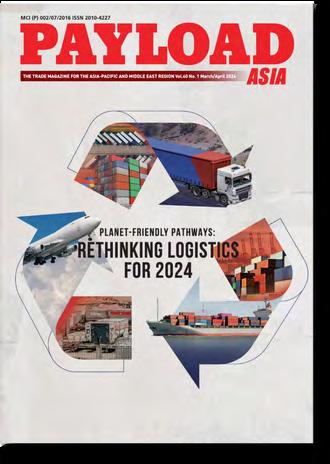


th

Awards Gala Dinner
Friday, 24 October 2025
Four Seasons Hotel Singapore







th

Awards Gala Dinner
Friday, 24 October 2025
Four Seasons Hotel Singapore



If there’s one story that continues to define air cargo in Asia, it’s e-commerce. The region is driving growth at a pace unmatched anywhere else, with digital platforms, fulfilment solutions, and cross-border flows reshaping how goods move across markets. But with this momentum also comes new pressures — from fragmented shipments and tighter turnaround times to the need for digital skills and workforce resilience.
In this issue, we explore how industry leaders are responding. KLN shares how it is scaling automation, smart warehouses, and digital platforms to keep up with Asia’s surging online trade. cargo.one shows us how freight forwarders are strengthening their competitiveness with real-time connectivity and procurement tools. And IBS Software reminds us that technology is also about people — and how digitalisation can help ease operational pressures and build a more future-ready workforce.
Just as important, the conversation on safety continues to evolve. At APASS 2025 in Manila, lithium battery risks took centre stage, with experts calling for greater collaboration to manage dangerous goods across global supply chains. It’s a timely reminder that even as we race ahead with innovation, the fundamentals of safety and compliance must remain
As we look ahead, the opportunity — and responsibility — for air cargo in Asia is clear: to build a sector that is not only faster and smarter, but also safer, more resilient, and more


Japan Airlines unveils revamped JALCARGO website with enhanced digital features
Korean Air to purchase 103 Boeing aircraft plus GE engines totaling KRW 70 trillion
AIR ONE International Holdings takes delivery of first new Boeing 777 freighter, with second aircraft due by the end of the year
American Airlines Cargo expands ExpediteTC°℠ cold chain capabilities for lifesaving shipments
Etihad Cargo reports strong H1 2025 performance
Cathay Cargo pioneers seamless intermodal perishables imports into the wider Greater Bay Area with AirLand Fresh Lane Turkish Cargo launches a new product for the aviation industry: TK AERO
All Nippon Airways and Air Incheon announce codeshare on
Cainiao and Qatar Airways Cargo expand strategic partnership to
Silk Way West Airlines welcomes third Boeing 777 Freighter to Baku AIRPORTS
Glasgow Prestwick Airport launches new Scotland to China seafood export service
Liège Airport reports strong summer growth as it co-hosts ACE Cargo Event 2025
Fraport reports passenger and cargo growth in August 2025
HKIA launches Air-Land Fresh Lane
Maastricht Aachen Airport welcomes Avianca Cargo
E-commerce handling expertise lands WFS new 3-year contract with Air China Cargo in Liège
Riyadh Air and SATS Saudi Arabia forge strategic partnership to elevate cargo hub operations at King Khalid International Airport and beyond
Korean Air partners with Swissport on air cargo at New York JFK
PACTL unveils full-pallet Magnetized Material Detector to boost air cargo safety and efficiency
Menzies Aviation expands Sydney operations with third cargo facility
Hactl Think Park achieves BEAM Plus Platinum rating
DHL expands certified cold chain capacity at KLIA to meet pharma demand
Gebrüder Weiss expands in Türkiye with majority stake in Istanbul-based customs logistics provider
Dachser expands wine and spirits logistics services in the Asia Pacific
Cainiao expands “Global Five-Day” network to six new Eurasian markets
Seafrigo caters to Australian export demand with new state-of-the-art Melbourne facility
Kuehne+Nagel and the LEGO Group open new regional distribution centre in Vietnam to support Asia Pacific growth
AerFin celebrates logistics partnership with B&H Worldwide in South East Asia
Headway JSC strengthening the supply chain of agricultural products in Vietnam’s Central Highlands region
SCGJWD Logistics implements roadmap further expanding cold storage investment base from CLMV + China to high-growth ASEAN countries



Alexander Winter takes over as Managing Director of Dachser Air & Sea Logistics
Swissport appoints Ajay Barolia as Executive Vice President Cargo North America
Cargo Community Network and INNOSYS Integrate FreightX into CUBEforall Platform
CARGOLAND: LGG Tracking is the first step
Lufthansa Cargo optimises digital services

The Federal Aviation Administration and the Civil Aviation Authority of Singapore enhance
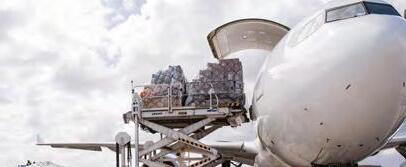

WestJet
Stefan-Kenan


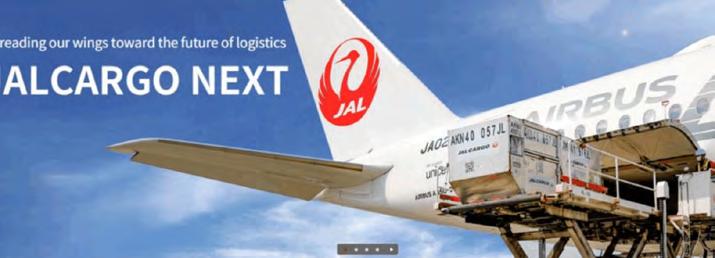
Japan Airlines Co., Ltd. (JAL) fully renewed its cargo website on August 28, 2025, offering a more convenient, clear, and user-friendly platform. The redesigned site will feature new content, improved navigation, and enhanced support tools to better serve customers.
Easier to navigate
The website’s structure has been reorganised with visually intuitive elements for quick access to information. Its responsive design ensures smooth browsing across desktops, tablets, and smartphones with consistent functionality.
Clearer and more informative
Alongside popular existing content, JAL is introducing new features, including the “JALCARGO NEXT” column, case studies, a sustainability section, and a “Fresh from the producer” page to highlight its services.
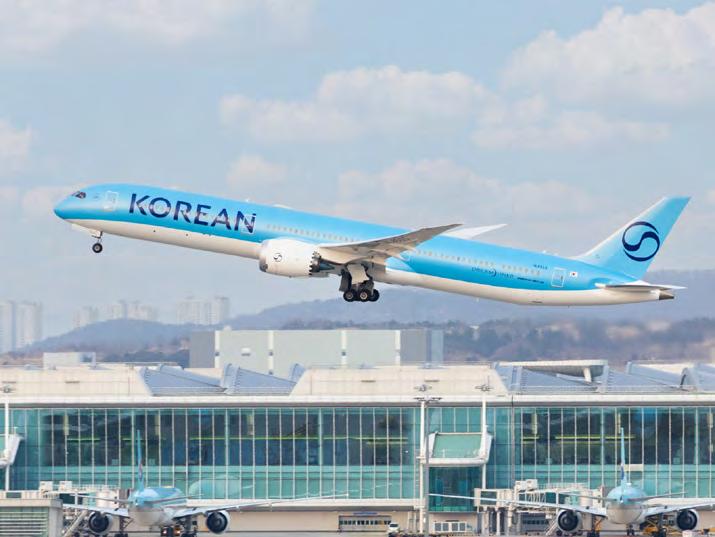
Korean Air has announced plans to purchase 103 next-generation aircraft from Boeing, 19 spare engines from GE Aerospace and CFM International, and a 20year engine maintenance program with GE
Aerospace, valued at about USD 50 billion (KRW 70 trillion).
The order includes 20 Boeing 777-9s, 25 Boeing 787-10s, 50 Boeing 737-10s, and eight Boeing 777-8F freighters, with phased deliveries through 2030. The airline will also acquire 11 spare engines from GE Aerospace and eight from CFM International, alongside long-term maintenance services for 28 aircraft.
Signed in Washington D.C. on 25 August, the agreement was formalised by Walter Cho, Chairman and CEO of Korean Air and Hanjin Group; Stephanie Pope, President and CEO of Boeing Commercial Airplanes; and Russell Stokes, President and CEO of Commercial Engines & Services at GE Aerospace.
More user-friendly
To strengthen customer support, the renewed site will include a chatbot, expanded FAQs, and an inquiry form for faster, tailored responses.
Further enhancements
Future updates will add enhanced search functions for flight schedules and irregular operation notices, expanded real-time email notifications, a restricted cargo search tool, and integration with cargo booking portals.
JAL aims to leverage the platform as a realtime communication hub, offering timely updates and continuously refreshed content to ensure accessibility and engagement for all users.
The investment supports Korean Air’s long-term growth strategy following its integration with Asiana Airlines and reflects delivery delays affecting the global aviation industry. The carrier aims to standardise operations around five highly efficient aircraft families: Boeing 777, 787 and 737, plus the Airbus A350 and A321neo. This streamlined fleet will help ensure capacity growth, improve fuel efficiency, reduce emissions, and enhance the customer experience.
Korean Air highlighted its longstanding partnership with the U.S. aviation industry, noting close collaboration with Boeing, GE, Pratt & Whitney, Hamilton Sundstrand and Honeywell. The airline said the deal strengthens its operational capabilities and reinforces its role as a bridge between Korea and the U.S.
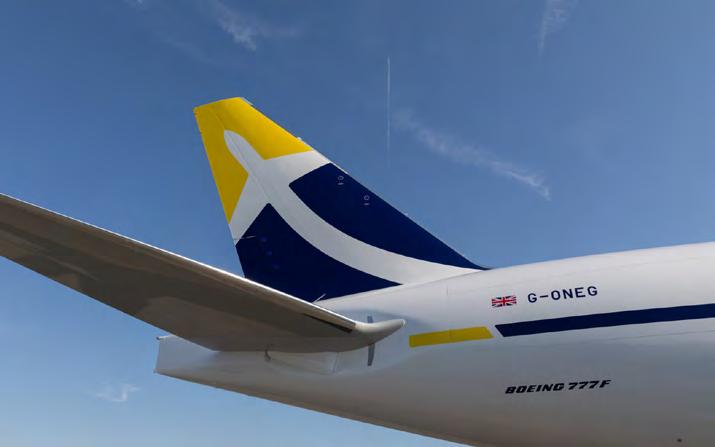
AIR ONE International Holdings has taken delivery of its first Boeing 777 Freighter at Boeing’s Everett facility in Washington. The aircraft is the first of two 777Fs purchased by its aviation asset management subsidiary, AeroTransCargo FZE, with the second due in Q4 2025.
The freighter will be operated under lease by British cargo carrier One Air, an AIR ONE affiliate, and enters service in the airline’s blue, yellow, and white livery.
“This marks the delivery of our first-ever 777F, which complements the 747-400Fs we already operate. Along with a second 777F joining soon, this is the start of our longterm fleet acquisition strategy to become a leading global cargo capacity provider,” said Guneet Mirchandani, Chairman of AIR ONE International Holdings.
David Tattersall, CTO at One Air, said the 777F opens “new and exciting opportunities” alongside its 747-400Fs as the airline continues to expand routes between Asia, Europe, and the Middle East.
Boeing’s Omar Arekat added that the 777F will deliver “capacity, range and reliability to support their customers’ expanding operations.”
AIR ONE is the commercial brand of AIR ONE International Holdings, managing AeroTransCargo SRL (Moldova), RomCargo Airlines (Romania), and One Air (UK). Its widebody fleet now totals 12 freighters: 11 Boeing 747-400Fs and one 777F.
With offices in London, the UAE, and Hong Kong, AIR ONE provides global charter, ACMI solutions, and soon, scheduled services, connecting key trade lanes with flexible, customer-focused air cargo capacity.

American Airlines Cargo has introduced major upgrades to its ExpediteTC°℠ product, reinforcing its role in transporting temperature-sensitive pharmaceuticals, biologics, and life sciences shipments.
The carrier has expanded its 24/7 control tower monitoring to include active temperature-controlled units, ensuring continuous oversight and proactive intervention during irregular operations. Enhanced training for team members also strengthens service quality for critical shipments.
On July 1, American Airlines Cargo enabled online booking for ExpediteTC°℠ passive shipments cooled by dry ice or gel packs via aacargo.com, improving customer experience and advancing digital innovation.
“Our customers trust us with shipments that change lives. ExpediteTC°℠ reflects our commitment to delivering these vital products with precision and care,” said Greg Schwendinger, President of American Airlines Cargo.
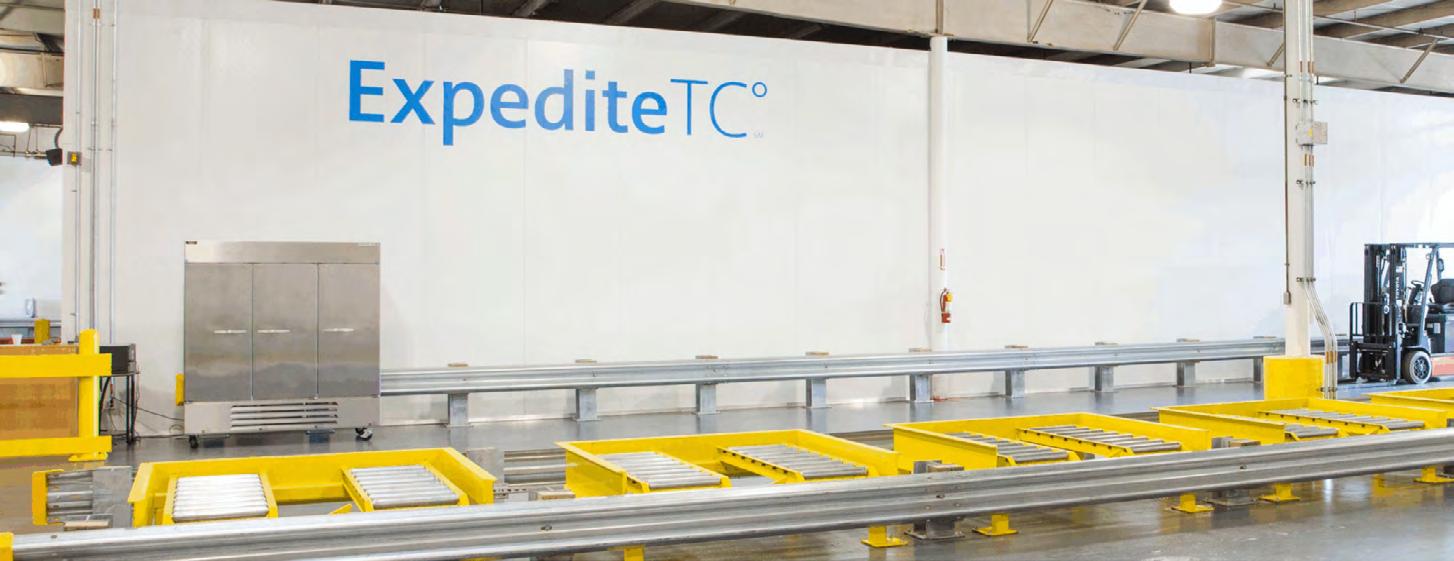
At the heart of its network is the CEIVcertified 25,000-square-foot Philadelphia International Airport (PHL) life sciences facility, featuring controlled room temperature, refrigerated and frozen storage, an active container management area with charging for 30+ RKNs, advanced monitoring with 0.25°C accuracy, and full backup power.
The airline also operates CEIV-certified hubs at Miami, San Juan, Dallas/Fort Worth, and
JFK, supported by 30 CEIV- or GDP-certified stations worldwide. Teams are globally trained to ensure shipments remain on time and on temperature across key shipping corridors.
“Our goal is to be the most trusted airline in life sciences transportation. ExpediteTC°℠ is built on collaboration, innovation and a relentless focus on quality,” said Eric Mathieu, Head of Customer Experience.
Etihad Cargo, the logistics arm of Etihad Airways, reported strong performance across all markets in the first half of 2025, reinforcing the airline’s agility and resilience in a dynamic global landscape.
Positive performance was achieved across all regions year-on-year, with the overall cargo revenue increasing 9% year-on-year, reflecting growth in both capacity and yield.
Etihad Cargo’s flexible e-commerce strategy empowered SMEs and local businesses, strengthening Abu Dhabi’s role as a regional hub for logistics and digital commerce.
To meet rising demand, Etihad Cargo strengthened its fleet with the recent delivery of an additional Boeing 777 freighter from Atlas Air, further enhancing capacity and flexibility across its network.
The airline also deepened its strategic partnership with China’s SF Airlines, establishing a metal-neutral Joint Business Agreement that integrates operations and capacity across key trade corridors. This has introduced a weekly Shenzhen–Abu Dhabi freighter service and expanded frequencies on the Abu Dhabi–Ezhou route, raising weekly capacity between the carriers to approximately 630 tonnes.
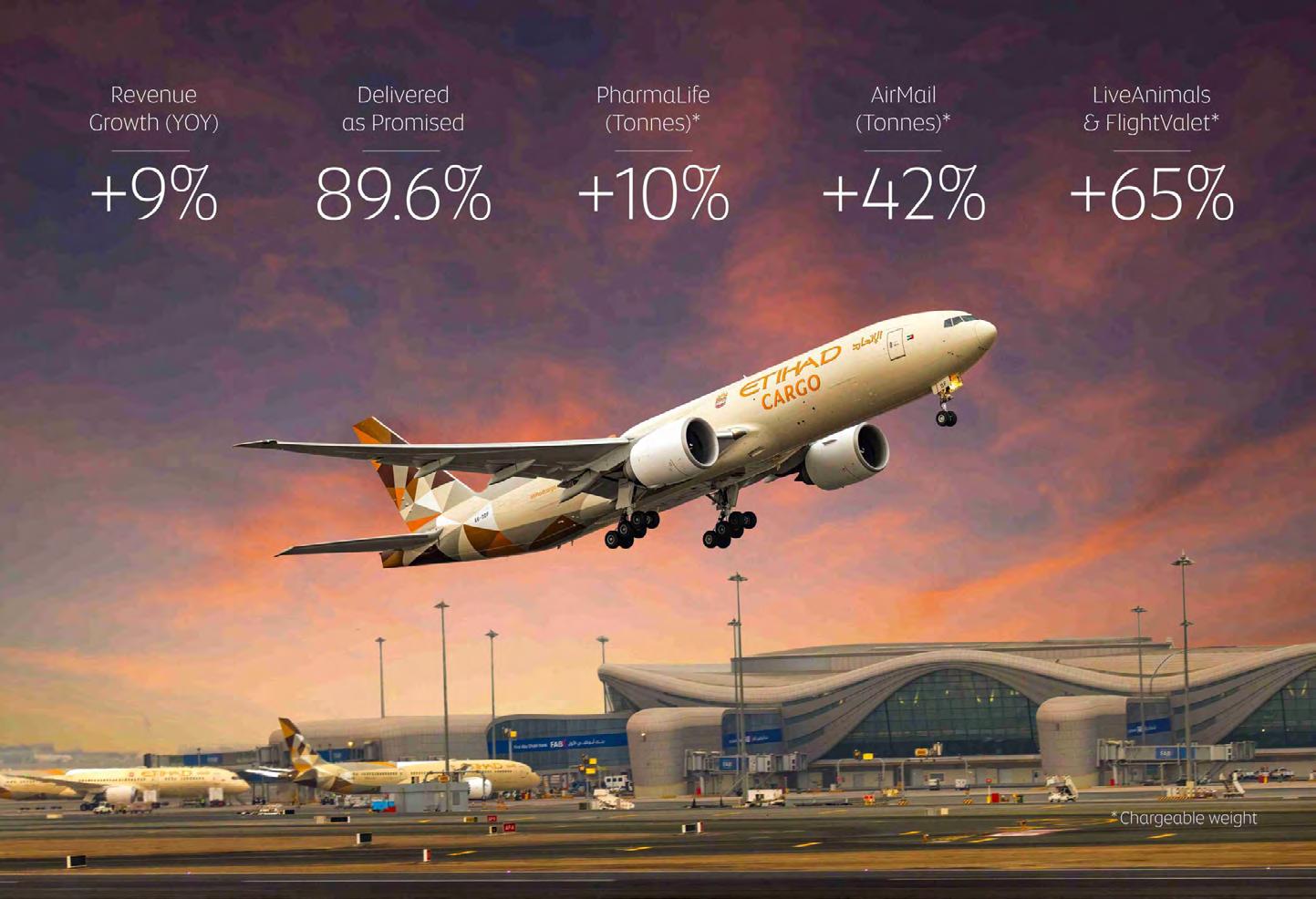
Etihad Cargo achieved an 89.6% yearon-year improvement in its Delivered As Promised rate through continuous service reliability.
Global capacity rose 8% year-on-year, supported by additional belly hold and
freighter operations, including new routes and redeployed capacity in high-demand markets. Abu Dhabi’s Zayed International Airport continued to serve as a strategic hub, reinforcing the UAE’s position as a global gateway for express cargo and e-commerce flows.

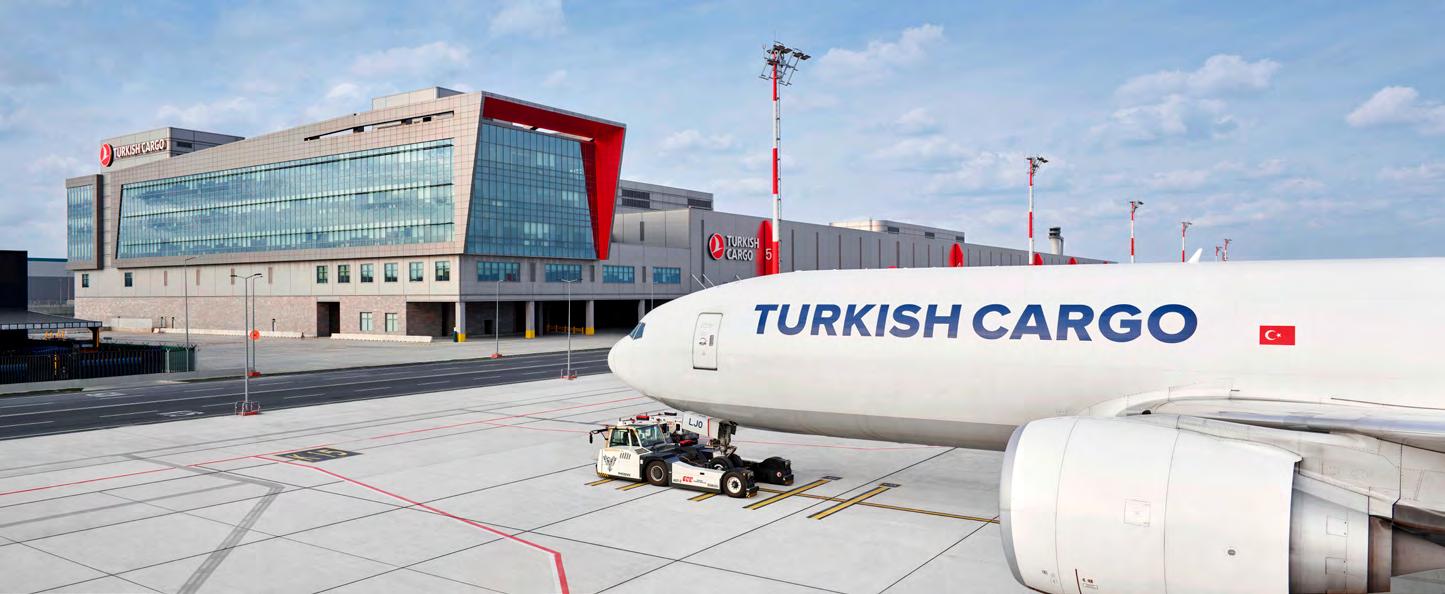
Turkish Cargo, the global air cargo brand of Turkish Airlines, has launched TK AERO, a logistics product developed to meet the timecritical transportation needs of the aviation industry. The new service offers two segments, SPARE and ADVANCED, to provide tailored solutions for different requirements.
TK AERO SPARE focuses on the fast and secure transport of aircraft parts, from landing gear and wings to avionics systems, without weight
or size limitations. Shipments benefit from priority handling and loading procedures to ensure speed and reliability.
TK AERO ADVANCED is designed for large, heavy, and sensitive components such as aircraft engines and helicopter parts. The service goes beyond standard cargo processes by offering engineering-based planning, technical evaluations, and customised loading scenarios. Dedicated Aircraft Loadmaster
teams oversee every step of the process, from loading and fastening to unloading, ensuring operational precision with specialised equipment and 24/7 monitoring.
Digital integration enhances the service, with requests processed through the TKGO platform, enabling pre-booking, streamlined planning, and real-time communication with customers.
According to Ali Türk, Chief Cargo Officer at Turkish Airlines, TK AERO was developed with engineering at the centre, combining digital integration, expert teams, and a global network to deliver both speed and operational continuity.
The product also supports urgent AOG (Aircraft on Ground) scenarios through TK URGENT, guaranteeing capacity and quick transfer at the SMARTIST facility in Istanbul. By combining technical expertise, infrastructure, and agility, TK AERO aims to raise the bar in aviation logistics.
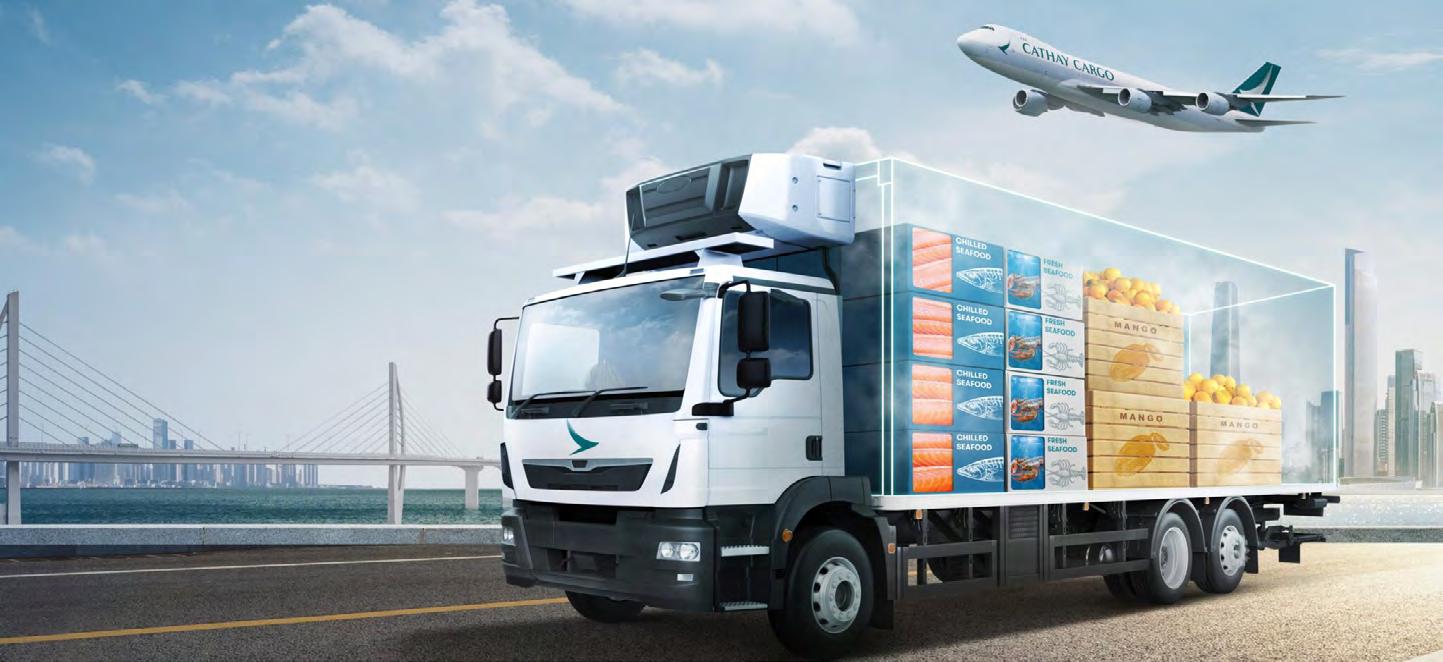
Cathay Cargo has become the first airline to activate the Air-Land Fresh Lane, launched by the governments of Guangdong and Hong Kong SAR, to streamline imports of fruit, seafood and other perishables into the Greater Bay Area (GBA). The service enables shipments arriving via Hong Kong International Airport to cross the Hong Kong–Zhuhai–Macao Bridge (HZMB) in temperature-controlled trucks
under a single air waybill, secured with GPS and accredited e-locks.
Live seafood and fruit shipments also benefit from a “Certificate for Transhipment Confirmation” issued by Hong Kong Customs, which simplifies China Customs’ inspection procedures and reduces costs for customers.
A new temperature-controlled inspection
facility at HZMB Zhuhai Port ensures greater efficiency during any spot checks. The initiative simplifies booking and offers real-time savings over alternative trucking routes.
“The new Air-Land Fresh Lane is great news for shippers moving premium perishables into the GBA,” said James Evans, General Manager Cargo Commercial at Cathay Cargo. “With 86 million consumers, the region represents a strong market for high-quality fresh products, further strengthening HKIA’s status as the world’s busiest cargo hub.”
The first trial shipments included live lobsters from Melbourne and geoducks from Los Angeles, which moved seamlessly from aircraft to trucks and across the border without delay.
Cathay Cargo, CEIV Fresh-certified, already offers trucking and sea links across the GBA. This new lane complements its freighter services and Cathay Fresh product, ensuring perishables from its global network reach the GBA market in peak condition.

All Nippon Airways (ANA) and Air Incheon began codesharing on freighter services operated between Japan and South Korea, starting 15 September 2025.
Under the codeshare agreement, ANA and Air Incheon will sell cargo space on flights operated by both carriers. By leveraging the combined strengths of their networks, the airlines will enhance connectivity and meet the growing demand for cargo transportation.
Air Incheon, which completed the integration
of Asiana Airlines’ freighter business on Aug. 1, 2025, also announced plans to rebrand as AIRZETA, subject to government approval. This integration positions the company as South Korea’s second-largest cargo airline operator.
ANA Holdings Inc. acquired shares of Nippon Cargo Airlines Co., Ltd. (NCA) on Aug. 1, 2025. By integrating NCA’s largefreighter capabilities with the ANA Group’s international network, ANA will strengthen support for the increasing role of global logistics.

ANA and Air Incheon remain committed to delivering high-quality, competitive services that meet customer transport needs through business growth and network partnerships. By strengthening their cargo operations, the two companies are dedicated to creating greater value for the growing cargo demand between Japan and South Korea.
Cainiao and Qatar Airways Cargo have expanded their strategic partnership to accelerate cross-border e-commerce delivery. The agreement, signed at the Cainiao Global Smart Logistics Summit in Hangzhou on 10 September, builds on their long-term collaboration to strengthen global connectivity and meet rising demand for reliable international logistics.
Under the deal, Cainiao will more than double its weekly charter flights on China–Europe routes, leveraging Qatar Airways Cargo’s operational expertise and global network. The move will provide merchants with greater flexibility and support Chinese businesses expanding internationally.
“Partnering with Qatar Airways Cargo, a globally renowned airline leader, further
strengthens our global logistics network and underscores our commitment to world-class e-commerce experiences,” said Wan Lin, CEO of Cainiao. “This partnership enhances our competitiveness and advances our vision of global delivery within 72 hours.”
Mark Drusch, Chief Officer Cargo at Qatar Airways Cargo, added: “China is one of the most important global trade partners, driving the highest demand for air cargo capacity. By combining our expansive network with Cainiao’s e-commerce expertise, we are uniquely positioned to deliver unmatched connectivity and service to customers.”
The collaboration reflects the shared vision between Cainiao and Qatar Airways Cargo to shape the future of global e-commerce.
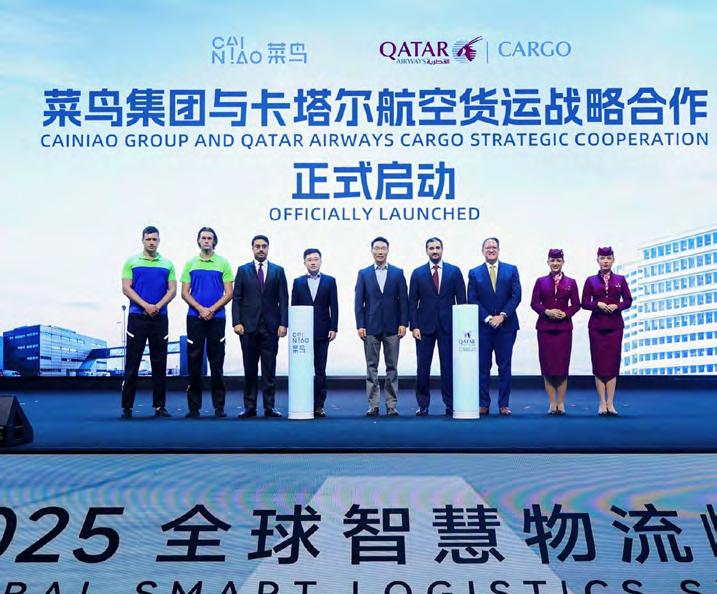
By expanding capacity and improving trade flows between China, Europe, and beyond, the alliance will create economic value, strengthen supply chains, and set new benchmarks in cross-border logistics.
Silk Way West Airlines announced the arrival of its third Boeing 777 Freighter at Heydar Aliyev International Airport, marking another milestone in the airline’s strategic fleet renewal program. The aircraft landed in Baku directly from Boeing’s facilities in Seattle, joining the carrier’s growing roster of next-generation freighters.
This delivery is part of Silk Way West Airlines’ order for 10 Boeing 777F aircraft, to be fulfilled by 2030. The new freighters will gradually replace older aircraft in the fleet, significantly enhancing operational efficiency and reducing environmental impact. This step aligns with the company’s ongoing efforts to meet its environmental goals, including reducing carbon emissions and improving fuel efficiency across its operations.
“The arrival of our third Boeing 777F represents another important step in our long-term growth strategy,” said Wolfgang Meier, President of Silk Way West Airlines. “By expanding our fleet with modern, fuel-efficient aircraft, we are not only enhancing our global service offering but also reinforcing our commitment to environmental responsibility. This investment supports both our customers’ evolving needs and our vision for sustainable growth in the years ahead.”
Founded in 2012 in Baku, Silk Way West Airlines operates hundreds of flights each month to over 40 destinations worldwide. The airline’s current fleet includes Boeing 777F, 747-8F, and 747-400F aircraft, enabling it to carry more than 500,000 tons

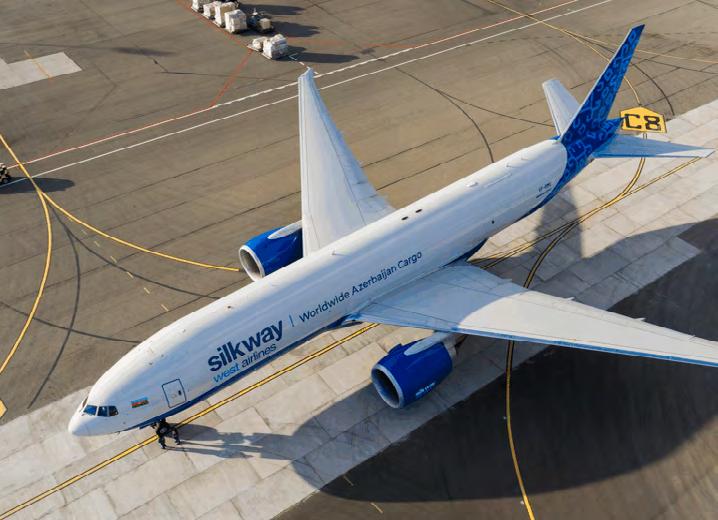
of cargo annually. The carrier expects the delivery of two Boeing 777F, two Boeing 777-8F, and two Airbus A350F aircraft by 2030, further reinforcing its sustainability and modernisation agenda

The airport has installed high-volume metal detectors, temperature tracking systems, and four chillers with an 87-tonne capacity in a dedicated facility for seafood exports to China and mainland Europe.
“The value of Scottish salmon exports reached a record £844 million in 2024, with the Chinese market growing 60% in value and 107% in volume,” said Ian Forgie, CEO of Glasgow Prestwick Airport. “Our in-house expertise and investment make PIK a standout hub for Scottish seafood, ready to meet rising demand.”
our ability to meet growing demand in China and Asia, while supporting jobs and communities in Scotland’s coastal and rural areas,” said Tavish Scott, CEO of Salmon Scotland.
China imported £76 million of Scottish salmon in 2024, a 60% year-on-year increase, with exports exceeding 8,175 tonnes, making it Scotland’s third-largest market.
Glasgow Prestwick Airport (PIK) has launched a new Scotland–China seafood export service after investing £1 million in new equipment and creating a dedicated cool chain team.
PIK’s location near fish farms reduces farm-to-flight transit times, cutting trucking costs, lowering CO2 emissions, and extending shelf life by up to 18 hours.
“The new dedicated service strengthens

As the global air cargo community gathered in Liège on 8–11 September for the ACE Cargo Event, Liège Airport and its logistics hub Cargoland made an exceptional summer performance, with double-digit growth in volumes.
Traditionally a quieter period, July and August saw cargo volumes surge. In July, the airport handled over 109,000 tons (+14% year-on-year), while August set a new high with 111,500 tons (+29%). Aircraft movements also rose 9% in both months, reaching 2,464 in July and 2,354 in August.
Year to date, Liège Airport has processed 847,551 tons of cargo, up 13% compared to the same period in 2024, alongside 18,710 aircraft movements (+8%). These results highlight the hub’s resilience and ability to absorb rising demand, reinforcing its
“Creating a cool chain solution at PIK is a game-changer for producers,” Forgie added. “Our facilities make PIK attractive for Chinese freighters, and with eight weekly flights to Asia, exporting perishables from Prestwick rather than London is an easy choice.”
Local MP Alan Gemmell praised the project, highlighting its role in boosting cargo volumes and jobs in Ayrshire.
position as a key player in the European cargo landscape.
The strong performance set the stage for ACE 2025, which took place for the first time at the Palais des Congrès de Liège. Co-hosted by Liège Airport and Neutral Air Partner, the event followed last year’s successful e-commerce summit, which attracted 1,000 delegates. This year, more than 450 international leaders exchanged on new business models, strategies, and technologies shaping the sector.
The program offered insights into global air cargo trends, with a focus on innovation, digitalisation, and sustainability, as well as updates on developments at Cargoland.

In August 2025, Frankfurt Airport (FRA) welcomed 6.3 million passengers, up 4.1 percent year-on-year, driven by strong summer holiday demand. On peak travel days, including weekends and adjacent Fridays and Mondays, more than 200,000 travellers passed through FRA, with a record 221,360 passengers on August 3.
European holiday regions showed robust growth, led by Italy (+17.9%), Greece (+13.0%), and France (+7.5%). Demand for Norway and the Czech Republic also surged, rising 21.8 and 34.7 percent, respectively. On long-haul routes, Middle East traffic rebounded, with Lebanon (+197.8%) and Israel (+189.2%) seeing sharp increases.
Far East travel grew as well, boosted by Sri Lanka (+157.7%) and Thailand (+43.0%).
FRA’s cargo volumes rose 1.0 percent to 174,388 metric tons. Aircraft movements increased 6.4 percent to 42,946, while maximum takeoff weights (MTOWs) advanced 2.9 percent to 2.6 million metric tons.
Across Fraport’s international portfolio,
August also brought growth. Slovenia’s Ljubljana Airport (LJU) handled 186,226 passengers (+11.7%). Combined traffic at Fortaleza (FOR) and Porto Alegre (POA) in Brazil nearly doubled (+98.8%) due to last year’s flood-related closures in Porto Alegre. Lima Airport (LIM) served 2.3 million passengers (+2.4%).
Fraport’s 14 Greek airports welcomed 6.8 million passengers (+4.0%), while Bulgaria’s Burgas (BOJ) and Varna (VAR) airports recorded 857,211 travellers (+6.9%). Antalya Airport (AYT) on the Turkish Riviera handled 6.0 million passengers (+3.2%).
Overall, the airports actively managed by Fraport served 23.6 million passengers in August 2025, a 6.4 percent increase yearon-year

Hong Kong International Airport (HKIA) and the Hong Kong Customs and Excise Department (C&ED) officially launched the Air-Land Fresh Lane on 26 September, with over 200 partners from the air cargo and fresh trade sectors in attendance. The ceremony was officiated by senior officials, including Chan Tsz-tat, Commissioner of Customs and Excise, and Vivian Cheung, CEO of Airport Authority Hong Kong (AAHK).
The initiative, trialled since April, streamlines transhipment clearance for chilled aquatic products, live seafood, and fruits imported via HKIA and transported through the Hong Kong-Zhuhai-Macao Bridge. Goods can now be delivered to Zhuhai for Mainland clearance and reach the Greater Bay Area (GBA) within three hours of landing in Hong Kong.
Vivian Cheung said the Fresh Lane enhances HKIA’s connectivity with the GBA, expanding its cargo catchment and creating new opportunities for Hong Kong’s trade and logistics sectors. “The service strengthens
Maastricht Aachen Airport (MST) has added two new cargo flights to its weekly schedule following an agreement with Colombian airline Avianca Cargo.
Starting in October 2025, the South American airline will operate flights to and from the Dutch airport with an Airbus A330, which has a maximum payload capacity of 61 tons.
The additional routes will contribute to the upward trend in air cargo volumes that the airport has witnessed this year.
In the first eight months of 2025, MST saw a 25 per cent increase in cargo volumes in comparison to the same period last year.
Growth has been bolstered by the expansion of operations by Turkish Cargo and Emirates SkyCargo, as well as the arrival of My Freighter and Ethiopian Cargo.
“We are proud that, after My Freighter, Avianca Cargo has now also chosen Maastricht Aachen Airport,” said Dean Boljuncic, Head of Commercial Development, Maastricht Aachen Airport.
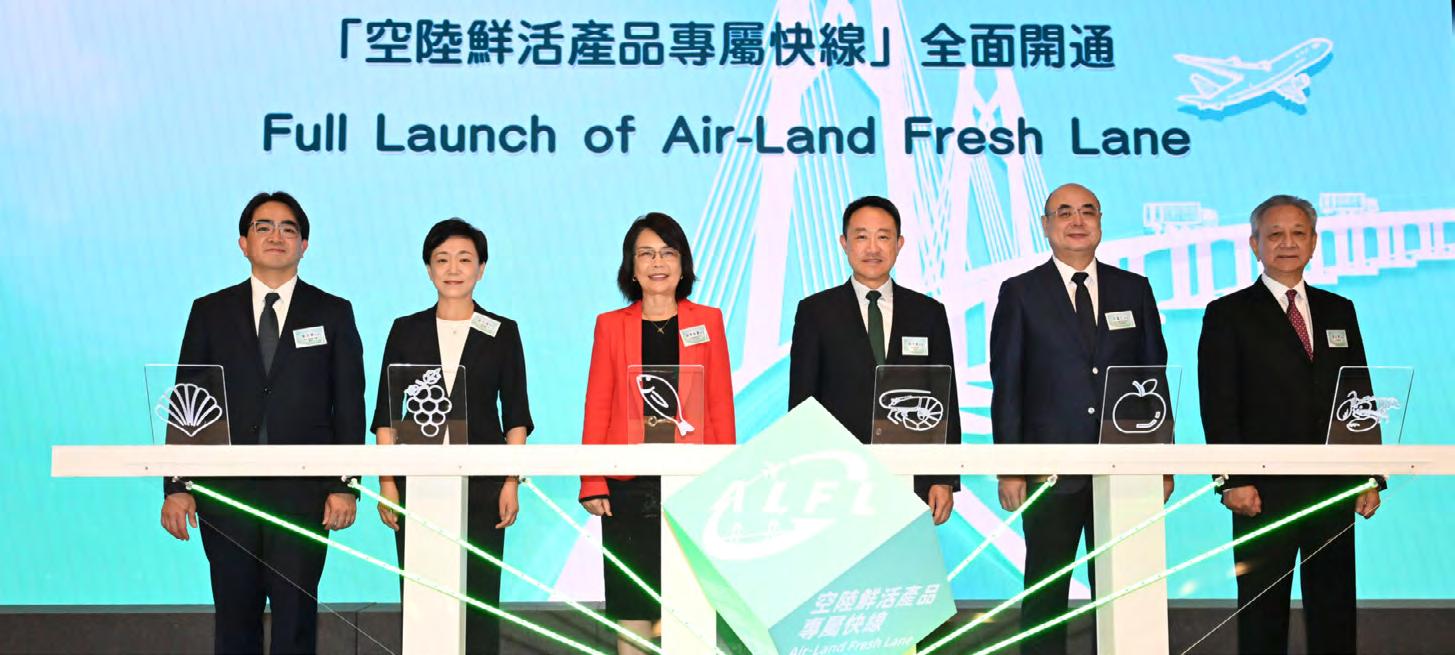
HKIA’s leading position in the air cargo industry,” she noted.
Commissioner Chan highlighted the collaboration with Mainland authorities, which aligned regulations to create a new clearance model for fresh food. He added that C&ED will continue to deepen cooperation with the Mainland to promote
GBA economic development.
HKIA has been named the world’s busiest cargo airport 14 times since 2010. It is also the first airport globally to achieve the full suite of IATA CEIV certifications, including CEIV Fresh, and boasts Asia’s largest fleet of cool dollies and advanced cold chain facilities to safeguard perishable shipments.
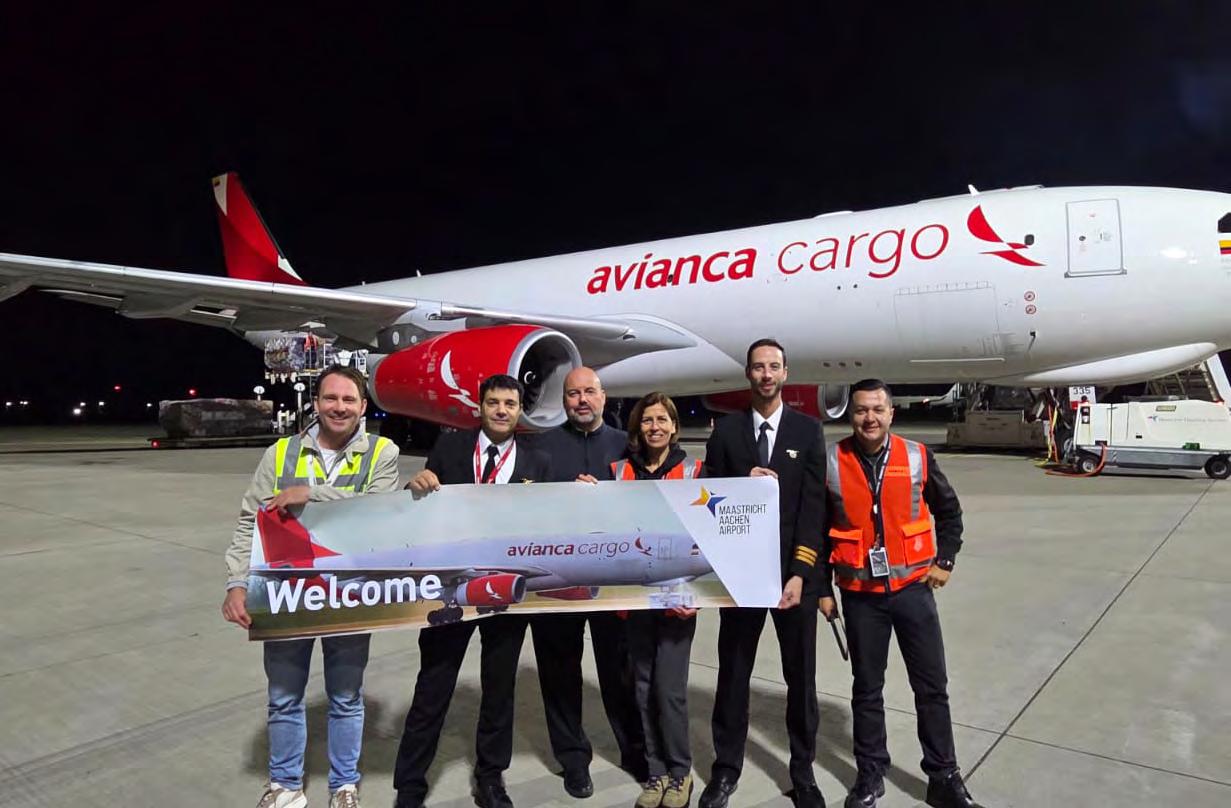
“With every new route, we increase the international connectivity of our airport. Our team is ready to introduce Avianca to the excellent and unbeatable handling for which MST is known.”
Connecting Quito, Miami, Maastricht, and Zaragoza, Avianca will import flowers from South America to Europe and export clothing for a prominent high-street fashion chain in Europe.
“In October 2025, we will begin transporting cargo from Latin America to Maastricht, a key connection point, and we look forward to continuing to grow at this strategic hub,” said María Ximena Marín Morales, Communication Manager, Business Units, Avianca.

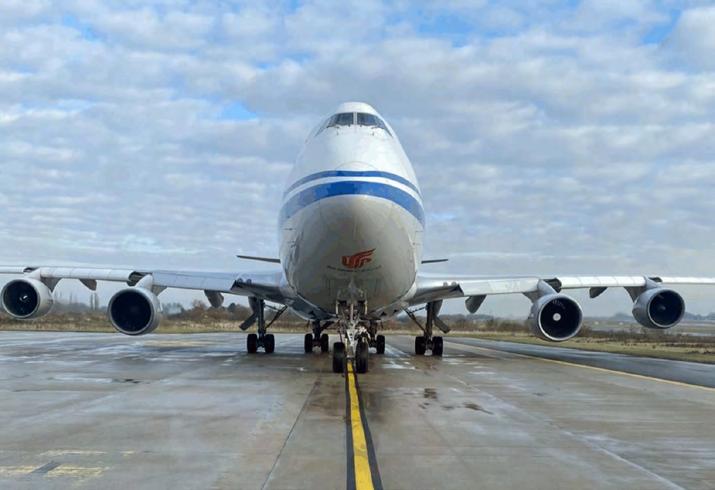
Worldwide Flight Services (WFS), a SATS company, has won a three-year contract extension with Air China Cargo in Liège, supported by its reputation for fast and
efficient handling of e-commerce shipments moving through the Belgian airport.
Under the new contract, WFS provides ramp handling and warehouse handling for cargo carried onboard Air China Cargo’s Boeing 777 and Airbus A330 weekly freighter flights into Liège from Chengdu, Hangzhou, and Shanghai. This includes buoyant inbound e-commerce volumes alongside high demand to move general cargo from Belgium to China.
WFS and Air China Cargo are both contributing significantly to the growth of Liège Airport, which reported a 16% yearon-year increase in volume in 2024. This
success has continued into 2025, with the airport welcoming 6,772 cargo flights in Q1 – up 6.2% annually – as freight throughput rose 5.6%.
“Air China Cargo is a major customer of WFS across our international network. This new contract extension reflects our strong partnership with the airline in Liège, where WFS has made a significant commitment and investment in our facilities and e-commerce handling services to suit the specific requirements of Air China Cargo and other customers needing this expertise. We thank Air China Cargo for their continued trust in WFS,” said Marc Claesen, Senior Vice President Commercial EMEAA at WFS.
Air China Cargo is handled in WFS’ 12,000sqm facility at Liège Airport.
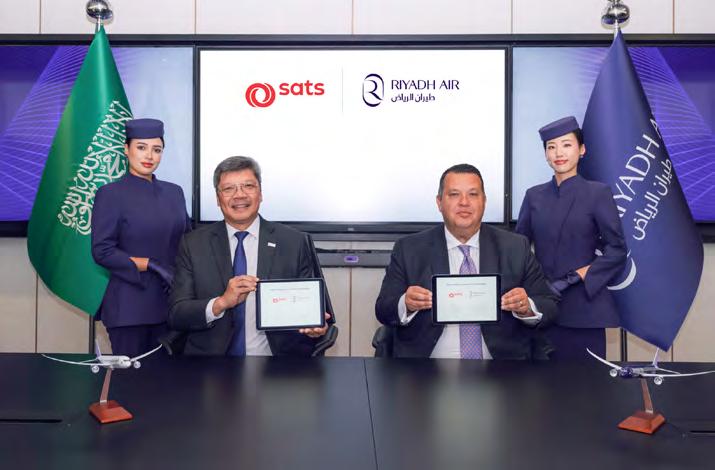
Riyadh Air, Saudi Arabia’s new national carrier, has signed a five-year strategic partnership with SATS Saudi Arabia (SATS SA), a subsidiary of SATS Ltd, to provide comprehensive cargo handling services across the Kingdom.
The agreement covers major cargo
operations at Riyadh Air’s hub at King Khalid International Airport (RUH), with additional support at King Fahd International Airport (DMM) and King Abdulaziz International Airport (JED). SATS SA will also build hub management capabilities to position Riyadh as a premier regional cargo hub, supporting the Kingdom’s Vision 2030 goal of handling 4.5 million tons of air cargo annually.
“This partnership marks a pivotal milestone in Riyadh Air’s journey to become a leading global carrier,” said Adam Boukadida, Chief Financial Officer, Riyadh Air. “By leveraging SATS’ expertise, we are laying the foundation for a world-class cargo offering that supports Saudi Arabia’s logistics ambitions.”
Bob Chi, CEO Gateway Services Asia Pacific, SATS Ltd, added: “This partnership aligns
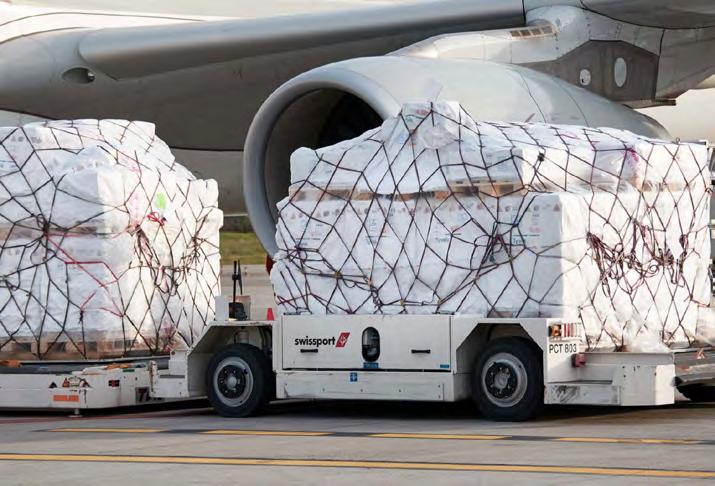
Korean Air has signed a five-year contract with Swissport to manage and operate Cargo Building 9 at John F. Kennedy International Airport (JFK), effective September 1, 2025. The agreement gives Swissport full operational and sublease responsibilities for the 232,500 sq. ft. facility, with major
investments planned in automation, ecotech infrastructure, and digital innovation.
Through upgrades, including a revamped ETV system and new temperature-controlled storage, annual throughput capacity will rise from 200,000 to 295,500 tons. Dedicated Korean Air Cargo operations will begin with 80 staff, scaling up to more than 390 employees as the facility reaches full capacity.
“This contract marks our first large-scale collaboration at a single location and reflects our joint commitment to operational excellence,” said Nelson Camacho, CEO of Swissport North America and Canada. “We are investing in automation, transparency, safety, and IATA CEIV and GDP certifications to deliver best-in-class service.”
Riyadh Air’s goal of connecting over 100 destinations globally by 2030 with our commitment to delivering world-class cargo solutions.”
SATS SA will provide dedicated services at its 60,000 sqm Riyadh terminal, equipped for pharmaceuticals, e-commerce, live animals, valuables, and dangerous goods. Riyadh Air will also gain access to SATS’ global network of 225 stations, supported by 250 airline partners and freight forwarders.
Hub management will be powered by SATS’ COSYS+ cargo system and digital automation tools, ensuring real-time visibility, scalability, and efficiency to support Riyadh Air’s longterm growth.
Jaedong Eum, EVP and Head of Cargo Business at Korean Air, added: “Together with Swissport, we will establish a blueprint at JFK for sustainable, high-quality operations.”
Swissport also plans to operate JFK’s first all-electric Ground Support Equipment (GSE) fleet for freighter operations, supported by new charging infrastructure in cooperation with the Port Authority. Additional sustainability initiatives include biodegradable materials to reduce plastic waste.
“Our strategy is grounded in safety, consistent quality, and transparency,” said Ajay Barolia, EVP Cargo, Swissport North America. “With eco-efficient GSE, automation, and high-density racking systems, we are future-proofing Cargo Building 9 for growth.”

The boom in cross-border e-commerce has led to millions of daily air shipments, some containing magnetic materials that can interfere with aircraft compasses. Classified as Class 9 Dangerous Goods, these items pose safety risks and can cause costly delays.
“Traditional inspections, which rely on piece-by-piece checks, are inefficient and costly, especially with today’s complex e-commerce cargo,” said Lu Min, Deputy General Manager and leader of PACTL’s Magnetised Material Screening Project. “A single ULD can contain thousands of diverse items, making compliance increasingly difficult.”
To address this, Shanghai Pudong International Airport Cargo Terminal Co.,
Ltd. (PACTL) has developed the patentpending Magnetised Material Detector, an advanced device for rapid full-pallet screening. The system, created with the support of the China Academy of Civil Aviation Science and Technology, uses four TMR sensor arrays in a gate-style frame to perform all-directional magnetic field analysis. Its algorithms precisely locate sources of risk and distinguish safe components from hazardous materials. A three-tier scanning system—quick, semi, and full scan—adapts to diverse operational needs.
The detector reduces labour, cuts inspection costs, and ensures fast compliance with IATA Dangerous Goods Regulations, strengthening flight safety without slowing cargo flows.
Menzies Aviation, the leading service partner to the world’s airports and airlines, has opened its third cargo warehouse at Sydney International Airport (SYD). The new 5,000 sqm facility, known as ‘M1’, strengthens Menzies’ position in Australia’s largest cargo hub and expands its global footprint to 74 warehouses and 85 freighter handling locations, moving 2.4 million tonnes annually.
Strategically located within Sydney Airport’s freight precinct, M1 features direct airside access and multiple freighter bays adjacent to the warehouse. Designed to handle rising demand for temperature-sensitive and e-commerce shipments, the refurbished
facility delivers enhanced efficiency and support for airline and freighter partners.
With the launch of M1, Menzies now operates three Sydney facilities covering more than 20,000 sqm, with a combined annual handling capacity of 250,000 tonnes. The addition of a second airside warehouse complements its off-airport site and strengthens its share in Sydney’s 600,000-tonne air freight market.
The expansion comes amid robust regional growth. According to IATA, Asia-Pacific carriers posted a 9.0% year-on-year rise in cargo demand in June, the strongest globally, with capacity up 7.8%. Cathay Cargo and
Hong Kong Air Cargo Terminals Limited (Hactl), Hong Kong’s largest independent cargo handler, has been awarded the BEAM Plus BI V2.0 Platinum rating for the upgrade of its learning and development centre, Hactl Think Park, at SuperTerminal 1.
Hactl Think Park reimagines the company’s training facilities with specialised spaces: The Lab for workshops, The Space for interactive experiences, and six multifunction classrooms for professional training.
The Platinum rating recognises the project’s eco-friendly features, including the use of Ecolabel-certified cleaning products to minimise environmental impact and promote healthier indoor spaces. Highefficiency CIC-certified Fan Coil Units reduce
power consumption by up to 70%, while LED lighting achieves around 20% savings compared with the Building Energy Code 2021. Water use is cut with WELS Grade 1 water taps, further optimising sustainability.
Located on the second floor of the North Office Block, Hactl Think Park underwent the rigorous BEAM Plus assessment, which evaluates green interiors based on health, hygiene, energy use, water quality, materials, and indoor environmental quality.
Kenneth Chan, Executive Director –Engineering & Facilities Services, said: “This recognition and the comprehensive assessment we undertook show our ongoing commitment to sustainability


“Magnetic hazards have long challenged the air cargo industry. This detector improves detection accuracy, reduces manual workload, and most importantly, enhances aviation safety,” said Carsten Hernig, Deputy General Manager at PACTL.
Future enhancements will include data integration, lightweight modular designs, and adaptability to varied environments, keeping the detector at the forefront of aviation safety innovation.
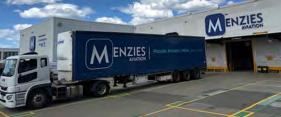
United Cargo are the first partners to begin operations at M1.
“Our investment in Sydney underscores our commitment to reliable, high-quality cargo services,” said Beau Paine, EVP Cargo. “As Australia’s largest air cargo gateway, Sydney is critical to our global network.”
Kayla Moa, SVP Cargo Oceania, added: “From one off-airport site 23 years ago to today’s extensive network, our growth reflects the dedication of our 195-strong Sydney team.”

across all areas of our business. Our stakeholders, staff, and customers will all benefit from this reimagined facility.”
In addition to sustainable building practices, Hactl incorporated upcycled materials, natural light, digital training materials, and partnerships with eco-conscious design studios, making Think Park not only a training hub but also a showcase of the aviation industry’s green vision.
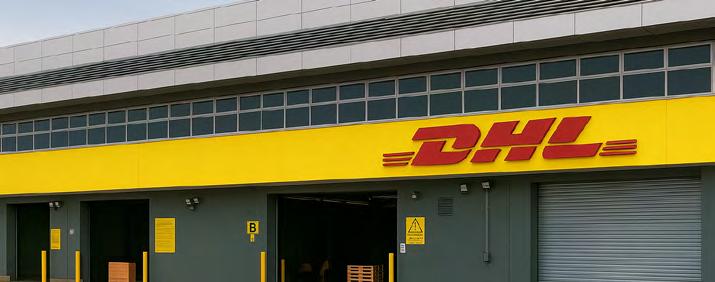
DHL Global Forwarding has strengthened its cold chain capabilities in Malaysia, becoming the first forwarder to operate a dual-temperature certified facility at Kuala Lumpur International Airport (KLIA) Free Commercial Zone. The 38,000-square-foot site, accredited with both DHL Air GxP and IATA CEIV Pharma certifications, supports storage at 15–25°C and 2–8°C, ensuring regulatory compliance and flexibility for life sciences and healthcare shipments.
“Malaysia is strategically located to serve as a regional hub for global medical technology companies,” said Praveen Gregory, Managing Director, Singapore, Malaysia and Brunei, DHL Global Forwarding. “With Asia Pacific’s pharma market accelerating, our KLIA facility is ready to deliver best-in-class standards and expertise for customers.”
The site features dedicated cold rooms, high-security storage, 24/7 monitoring systems, and eco-friendly infrastructure. DHL also provides reefer truck transfers to maintain end-to-end cold chain integrity and reduce third-party handling. Operations are supported by a dedicated team of Life Sciences Specialists trained to IATA and GDP standards.

(L-R) THOMAS MOSER (Director and Regional Manager Black Sea/CIS at Gebrüder Weiss), MURAT DOĞAN (Managing Director of Sienzi Lojistik), WOLFRAM SENGER-WEISS (CEO at Gebrüder Weiss), and MIŞEL YAKOP (Country Manager Türkiye at Gebrüder Weiss).
Gebrüder Weiss has taken a majority stake in Sienzi Lojistik, a top provider of customs and warehouse logistics services
in Istanbul. Operating as an independent entity, the company will now trade under the name Sienzi Lojistik – a Company of Gebrüder Weiss. The transaction is set to close in January 2026, subject to regulatory approval. Murat Doğan remains managing director of Sienzi Lojistik and continues to hold a stake in the company.
“This investment strengthens our position in Türkiye and integrates our partner’s customs warehousing expertise into the Gebrüder Weiss network. It’s a strategic step to offer seamless, one-stop logistics solutions,” said Wolfram Senger-Weiss, CEO of Gebrüder Weiss.
“Partnering with Gebrüder Weiss enhances our competitiveness, broadens our
DHL’s commitment to sustainability is evident in the facility’s use of energyefficient compressors, CFC- and HCFC-free materials, and exploration of frozen storage solutions, including mobile freezer units for -20°C commodities.
Asia Pacific’s healthcare logistics market is projected to grow from USD 17.6 billion in 2022 to USD 29.5 billion by 2030. Backed by a €500 million regional investment and a network of over 30 certified pharma stations, DHL aims to support this growth under its “Strategy 2030,” positioning itself as the partner of choice for life sciences logistics across the region.
service portfolio, and supports Türkiye’s role in global trade,” added Murat Doğan, Vice President of the Turkish Customs Warehouse Association.
Gebrüder Weiss and Sienzi Lojistik have partnered in Türkiye for nearly a decade, with the bonded warehouse central to imports, exports, and transhipment. “We store goods until customs are cleared or transit is complete and consolidate shipments from multiple origins—giving customers flexibility, cost efficiency, and reliability,” said Mişel Yakop, Country Manager Türkiye.
With the acquisition, Gebrüder Weiss is expanding its Istanbul hub into a full-service logistics centre and targeting sectors such as textiles and industry. “Istanbul’s location at the crossroads of Europe and Asia makes it a strategic gateway, with strong growth potential,” said Thomas Moser, Director and Regional Manager Black Sea/CIS.

offers integrated end-to-end supply chain solutions for wine and spirits businesses between Europe and APAC. The service combines air and sea freight with Dachser’s established European Road Logistics network, ensuring efficiency, product integrity, and visibility from vineyard to destination.
engaging with traders, importers, distributors, and hospitality professionals.
APAC’s position to meet rising demand as the regional market is forecast to grow at 5–6% annually until 2030.
Leveraging its multimodal network, Dachser
“The region presents significant opportunities for Dachser to apply our established expertise,” said Roman Mueller, Managing Director Air & Sea Logistics Asia Pacific. “We are committed to delivering wine and spirits with excellence, ensuring a first-class journey from European wineries to APAC markets.”
Dachser showcased its capabilities at ProWine Hong Kong 2025 under the motto “Wine and spirits, delivered with excellence,”
Its offering includes multimodal transport— air, sea (FCL and LCL), and European road freight—along with buyers’ consolidation, customs clearance, warehousing, temperature-controlled handling, and in-house insurance. “By managing the European journey through our own trucking network and container freight stations, we give customers reliability and efficiency,” said Sébastien Ferrandiz, Business Development Manager Food & Beverage Logistics APAC.
With more than 40 locations across APAC and a strong European backbone, Dachser is well-positioned to support supply chain growth and resilience in the region’s fastchanging beverage markets.

Cainiao has upgraded its “Global 5-Day Delivery” service, expanding to Vietnam, Hungary, Singapore, Qatar, the Philippines, and Austria by year-end. The cross-border express product now enables parcels from China to reach Europe in as fast as five calendar days, setting a new benchmark for the industry. The service is open to all cross-border e-commerce platforms and exporters.
Launched with AliExpress in September 2023, the product initially covered the UK, Spain, and the Netherlands. Continuous optimisation has reduced UK transit to a true five-day calendar promise, with a delivery success rate above 95% and merchant satisfaction exceeding 98% for three straight quarters.
“As a global leader in cross-border e-commerce logistics, Cainiao serves 90% of the world’s top platforms across more than 200 countries,” said William Xiong, Senior Vice President, Cainiao Group. “Driven by AI technology and precision operations, we’ve raised China-to-Europe delivery speeds to a new industry benchmark. Our goal is to extend 5-Day Delivery to more e-commerce markets worldwide.”
Faster delivery is proven to boost consumer experience and repeat purchases, with studies showing each hour saved can increase repeat rates by 1%–3%. Cainiao’s speed comes from dual optimisation: seamless operational management and advanced AI. Its machine-learning models achieve 80% accuracy in order forecasts,
Seafrigo Australia Pty Ltd, trading as Mode Logistics, has opened a new 10,000-squaremetre facility at Melbourne Airport, quadrupling its previous capacity and marking a key milestone in its growth strategy for food logistics.
The state-of-the-art warehouse is designed to support the company’s expanding airfreight business, with preload units handled more efficiently to extend loading windows for both day and night operations.
“The additional space allows us to preload overnight and in the morning, helping us meet critical cut-off times and improve service reliability,” said Jason Farrugia, CEO of Mode Logistics.
The site offers multiple temperaturecontrolled zones, including frozen (-16°C to -20°C), chilled (0°C to 4°C), and ambient storage, making it ideal for meat, fish, dairy, horticulture, and supermarket exports. Biosecurity-compliant features include fumigation chambers and enclosed dock shutters, ensuring alignment with Australia’s strict standards for biodiversity and biosecurity.
“Previously, we had to turn down business due to limited space. With this facility, we can meet demand and position ourselves for new markets,” Farrugia added.
Located within a 400-hectare logistics development, the warehouse offers direct

AI security checks improve productivity by 30%, and large-model classification supports customs and sorting across 40+ markets.
With 18 overseas sorting centres and a portfolio of three-day, five-day, and 10-day products, Cainiao offers scalable logistics solutions for platforms, independent stores, and global brands.

access to Victoria’s road network, providing seamless connectivity across Australia’s east coast. As one of the country’s top three export service providers, Seafrigo plans to enhance operations with upgraded warehouse management systems and quality inspection services later this year.
“This investment reinforces our commitment to excellence and global reach, opening opportunities particularly in the Middle East and Asia,” said Eric Barbé, President and Founder of Seafrigo.
Kuehne+Nagel and the LEGO Group open new regional distribution centre in Vietnam to support Asia Pacific growth
Kuehne+Nagel and the LEGO Group have expanded their partnership with the opening of a new Regional Distribution Centre (RDC) in Dong Nai, Vietnam. The facility will support LEGO Manufacturing Vietnam, the company’s new factory in Ho Chi Minh City, and serve as a hub for markets including Australia, New Zealand, Malaysia, Singapore, and Japan, with India, Indonesia, and others to follow in 2026.
Kuehne+Nagel will manage end-to-end logistics operations, covering factory transport from Vietnam and China, customs clearance, bonded warehousing, sea freight, and deliveries to Local Distribution Centres across the region.
“Our new RDC will play a critical role in
supporting long-term growth in the region by creating a shorter, more agile supply chain,” said P. Venkatram, Vice President, APAC-China Supply Chain Operations, LEGO Group. “We’re grateful for our continued partnership with Kuehne+Nagel, whose expertise helps us bring learning through play to millions of children.”
At launch, the 10,200 sqm facility will feature bonded storage, packing, and value-added services. By 2026, it will expand to 16,360 sqm, with capacity for 33,000 pallets and processing more than 150 containers per week.
“Our partnership reflects a shared commitment to operational excellence and sustainability,” said Bjoern Traemann,


Managing Director, Kuehne+Nagel Vietnam. “This includes using Sustainable Marine Fuel for all global container shipments and deploying EVs for last-mile deliveries.”
The LEED Gold-certified centre, equipped with solar panels and smart energy meters, is the LEGO Group’s fifth RDC worldwide and second in Asia Pacific, alongside Shanghai.
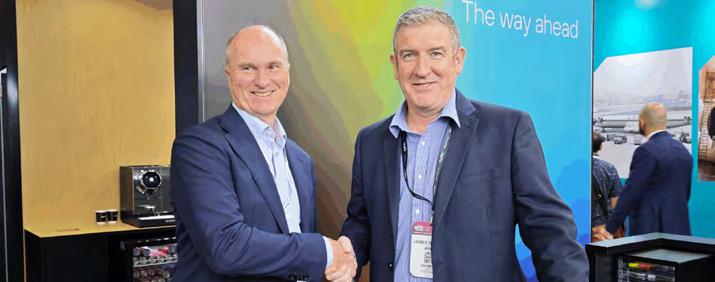
AerFin, the aviation asset specialist in aircraft, engines and parts, has marked the expansion of its logistics and warehousing partnership with B&H Worldwide, which has supported the company’s growth in Southeast Asia since 2022.
The collaboration began in Singapore with aviation parts, warehousing and inventory management before extending to Hong

Kong to support AerFin’s CDB project, involving the teardown of six aircraft at Hong Kong Airport.
The milestone was celebrated at MRO AsiaPacific in Singapore, where AerFin Chief Commercial Officer James Bennett and B&H Worldwide Chief Commercial Officer Matthew Warrington reaffirmed their commitment to further strengthening the partnership.
“Our partnership with B&H has been integral to our operations in Southeast Asia, ensuring customers receive the reliable, efficient service they expect from AerFin. We’re excited to build on the success we’ve achieved together as we enter the next
phase of growth,” said Bennett.
Warrington added: “This is a clear testament to the trust AerFin places in B&H’s aerospace logistics expertise. We are proud to continue supporting their expansion, providing customised packing and crating, inventory management, and cost-optimised shipping. Through our FirstTRAC platform, we deliver world-class aerospace logistics and supply chain visibility.”
The ongoing collaboration underscores AerFin’s commitment to investing in the region and working with trusted partners to deliver value-driven aftermarket solutions and reliable aircraft parts logistics for customers worldwide.
lanes connect Kontum, Gia Lai, Dak Lak, and the Cambodia border area to Ho Chi Minh City before reaching China, Korea, and Japan.
Headway JSC recently conducted a field survey in the Central Highlands, Vietnam’s strategic “agricultural centre,” to reinforce partnerships and build a sustainable supply chain targeting key markets such as China, Korea and Japan.
Optimising infrastructure and exports
While production capacity is strong, agriculture faces challenges in linking material areas with logistics systems. Headway surveyed production and packaging processes at farms and inspected transport routes from farms through warehouses and seaports. Main shipping
These efforts aim to deliver fast, safe transport for products with strict preservation needs, such as bananas and durians.
Specialised cold chain logistics
Headway has deployed tailored solutions to enhance the competitiveness of Vietnamese produce:
• Real-time temperature control to ensure quality.
• Streamlined quarantine and customs clearance to reduce costs.
• Proactive sourcing of reefer containers, even in peak season.
• 24/7 customer service with flexible shipment support.
Elevating Vietnamese exports
Vietnamese products like coffee, bananas, and durians continue to gain traction in global markets thanks to strict cultivation and preservation processes. By connecting farms seamlessly to international markets, Headway enables exporters to maintain quality and reliability while meeting growing demand.
With specialised logistics and cold chain expertise, Headway is committed to supporting exporters and positioning Vietnamese agriculture as a strong player on the global stage.
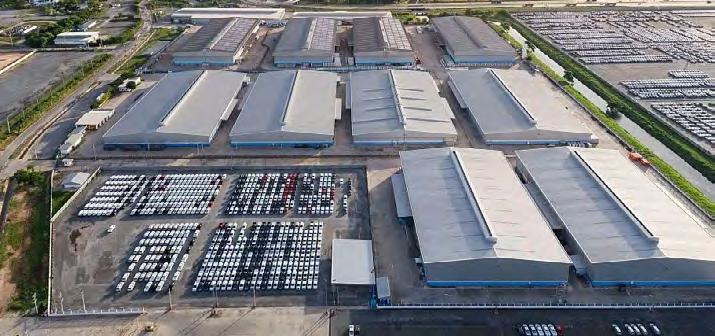
CGJWD Logistics PCL, ASEAN’s largest integrated logistics and supply chain provider, is expanding its cold storage business beyond CLMV + China into Indonesia, the Philippines, Malaysia, and Singapore. The move reinforces its position as a regional Cold Chain Hub, tapping into rising demand for temperature-controlled logistics.
In Indonesia, SCGJWD has operated since 2017 through PT SCG Barito Logistics, offering nationwide services with over 200 trucks. The company expects revenue of US$45 million in 2025, driven by Thai investors and local customers. A joint venture with Samudera Group will strengthen cold storage operations, with talks underway to add 30,000–40,000 pallets of capacity.
In the Philippines, SCGJWD formed a 2023 joint venture with Royal Cargo, which runs 140,000 sqm of cold storage. Expansion discussions are ongoing. In Malaysia, SCGJWD and Swift Haulage launched Swift Cold Chain Sdn Bhd, investing in three major projects: a 10,000-pallet warehouse in Shah
Alam (2026), a 10,000-pallet site in Johor Bahru (2026), and a Penang facility (2027).
SCGJWD continues to build its CLMV base, including an expanded warehouse in Cambodia and partnerships in Laos and Vietnam. These projects support crossborder flows, particularly for temperaturesensitive goods.
Co-CEOs Bunn Kasemsup and Charvanin Bunditkitsada highlighted that ASEAN’s cold storage market is forecast for rapid growth—Indonesia’s alone by nearly 80% to US$12.5 billion by 2027. SCGJWD is also investing in 10 cold storage warehouses across Thailand, covering over 160,000 sqm, to complete a nationwide network.

HAECO Engine Services (Xiamen), a member of the HAECO Group, has broken ground on a new facility to expand its engine overhaul, testing, and repair capabilities by Q4 2026. Currently specialising in GE90 engines, the company will extend services to include the GP7200, CF34-10A, and GE9X, with added space for maintenance and storage.
The new site, adjacent to the existing Phase 2 building, will span 4,420 sqm, with a total floor area of 10,015 sqm across two levels. Aligned with HAECO’s sustainability goals, it will incorporate energy-efficient LED lighting and solar panels to reduce environmental impact.
“As the aerospace industry grows, this facility reflects our commitment to innovation and sustainable development, enabling us to scale support across a diverse range of product lines,” said Sandra Nieuwenhuijzen, Group Director of Component and Engine Services at HAECO. “It underscores our long-term vision to support global aviation with cutting-edge solutions and operational excellence.”
Simon Smith, Director and General Manager of HAECO Engine Services (Xiamen), added, “Since our establishment in 2008, we have continually adapted to meet customer
ST Engineering’s Commercial Aerospace business marked the official opening of a new engine MRO facility in Paya Lebar, Singapore, officiated by Deputy Prime Minister and Minister for Trade and Industry Gan Kim Yong. The multimilliondollar expansion strengthens its position as a leading global engine maintenance provider.
The new facility will progressively double capacity for CFM56 and LEAP engine maintenance to over 300 engines annually by 2027. Together with its Xiamen, China, site, ST Engineering’s network will handle more than 400 engine shop visits a year. The expansion also broadens its services to include performance restoration and full overhaul shop visits for LEAP-1A and LEAP1B engines, meeting strong global demand as airlines renew their fleets.
The development is expected to create over 300 new high-value jobs in Singapore. Advanced technologies such as AI-enabled hardware sorters and automated cleaning systems will be deployed to boost efficiency and quality.
“This expansion reflects our commitment to staying ahead of industry demand and delivering the highest standards in engine MRO,” said Jeffrey Lam, President Commercial Aerospace, ST Engineering. “With more new-generation LEAP engines entering service, our new capacity and technology-enabled workforce will position us well to support customers worldwide.”
ST Engineering was the first MRO provider in Asia designated as a Premier MRO provider in CFM International’s LEAP open ecosystem in 2023. With more than 4,000 LEAP-

needs. This new facility enhances our capacity and develops capabilities for current and next-generation engines.”
HAECO Engine Services (Xiamen) is a licensed GE90 Service Provider and holds the GE90 GE Branded Service Agreement (GBSA) in Asia. In 2024, HAECO extended its GBSA and Offload Agreement for GE engines through 2040, securing its position in the GE9X global MRO network.
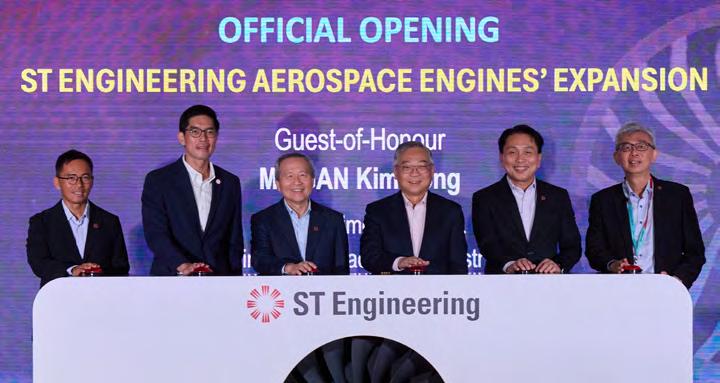
(L-R) JEFFREY LAM, President Commercial Aerospace, ST Engineering, JERMAINE LOY, Managing Director, Singapore Economic Development Board, TEO MING KIAN Chairman, ST Engineering, GAN KIM YONG, Singapore Deputy Prime Minister and Minister for Trade and Industry, VINCENT CHONG, Group President and CEO, ST Engineering, and TAY ENG GUAN, Head of Engine Services, Commercial Aerospace, ST Engineering
powered aircraft in service, the company’s expanded capacity underlines Singapore’s status as Asia’s leading aerospace hub.
Korean Air has entered into a strategic partnership with Boeing for enhanced collaboration in predictive maintenance. The agreement was signed at the MRO AsiaPacific 2025 Conference in Singapore.
The initiative builds on Korean Air’s established leadership in the field. The airline formed a dedicated Predictive Maintenance Team in August 2023 and currently utilises its own in-house developed operational solution, providing a robust foundation for the collaboration.
The partnership will focus on advancing data-driven maintenance methodologies. By analysing fleet-wide operational data to forecast component health, the collaboration aims to enhance operational readiness, maximise aircraft availability,
and reduce maintenance costs and flight disruptions, ensuring the highest levels of fleet reliability.
“Korean Air has advanced fleet reliability with our Smart MRO strategy and predictive maintenance. This collaboration with Boeing will further enhance our capabilities as we expand our fleet, integrating next-gen technologies to ensure a reliable operation,” said Chan Woo Jung, Senior Vice President and Head of Maintenance and Engineering at Korean Air.
“Korean Air’s operational experience complements Boeing’s engineering expertise and advanced software. We value their commitment to this collaboration aimed at improving efficiency and fleet reliability,” added Crystal Remfert, Senior

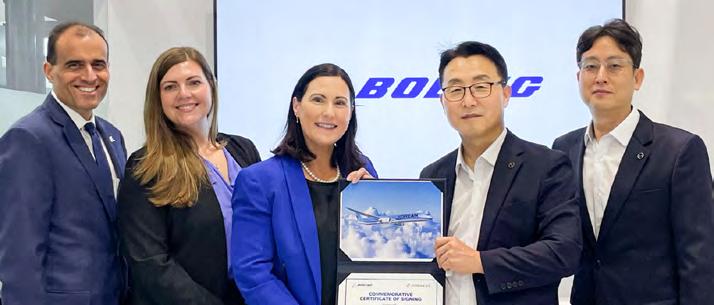
CHAN WOO JUNG, SVP and Head of Korean Air’s Maintenance and Engineering (second from right); JONG HOON OH, General Manager and Head of Korean Air’s Predictive Maintenance Team (first from right); and CRYSTAL REMFERT, Senior Director of Digital Services at Boeing Global Services (third from left), at the partnership signing ceremony in Singapore
Director of Digital Services, Boeing Global Services.
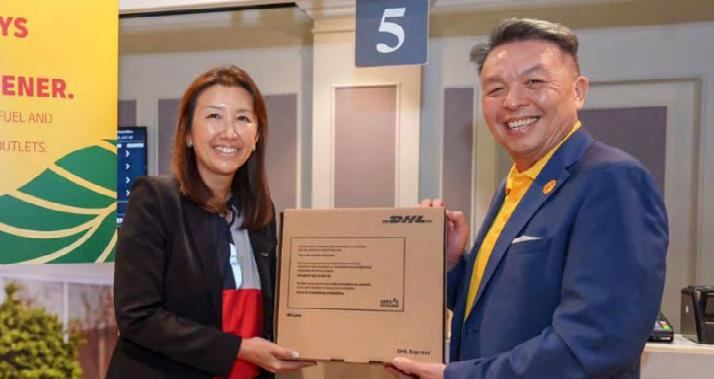
DHL Express, the world’s leading international express service provider, and SingPost, Singapore’s leading postal and eCommerce logistics provider, have entered a strategic partnership to make international shipping more accessible and sustainable across Singapore.
From March 2025, DHL Express services will be available at all SingPost post offices
islandwide, expanding from the 14 outlets included in the pilot. This makes it easier for walk-in customers to access DHL shipping solutions near their homes or workplaces. DHL parcels can also be dropped off daily at SingPost outlets at no extra cost, with parcel drop-offs already doubling since the pilot launch.
Each shipment automatically includes DHL’s GoGreen Plus service, which reduces greenhouse gas emissions by using sustainable aviation fuel (SAF) through a ‘book & claim’ system. DHL recently committed to purchasing 9.5 million litres of SAF in Singapore, its first for international flights departing Changi Airport and one of the largest SAF deals in Asia’s air cargo sector.

UPS has announced strategic enhancements to its intra-Asia air network to help businesses reach new markets faster and with greater reliability. The move comes as intra-Asia trade continues to grow, driven by strong demand in healthcare, technology, industrial manufacturing, and automotive sectors.
“We continue to see strong momentum across Asia Pacific with intra-Asia trade staying resilient,” said Wilfredo Ramos, President, UPS Asia Pacific. “UPS is helping customers strengthen supply chains through flexibility, faster delivery, and deeper connectivity.”
UPS has expanded its direct Shenzhen–Sydney service to five times weekly, offering over four times more capacity. This upgrade shortens delivery times from Mainland China, Hong Kong SAR, Japan, Malaysia, Philippines, South Korea, Thailand, and Vietnam to Australia by one day, now two business days, with next-day delivery available for Friday pickups. Exports to major Asian markets and imports from

FedEx has launched the FedEx Import Tool in Singapore, introducing a digital solution to simplify customs clearance and enhance visibility for importers. The automated single-window platform streamlines the import process, helping businesses manage growing trade complexities as Singapore’s imports reached S$611.4 billion in 2024, up 7.77% from the previous year.
The tool enables customers to submit clearance documents, comply with
regulations, and track progress in real-time. Key features include a unified self-service platform for document management and shipment tracking, a dashboard with clearance visibility up to 90 days post-pickup, proactive email and mobile notifications, flexible document uploads, quick retrieval of post-clearance paperwork, and versatile login options for shippers, importers, or consignees. Customers can also make convenient GST duties and tax payments directly from FedEx’s tracking page.
“Singapore’s position as a global trade hub calls for logistics solutions that harness innovation to address growing complexities,” said Eric Tan, Managing Director of FedEx Singapore. “The FedEx
Customers can also choose sustainable packaging options, such as 100% recyclable, FSC-certified DHL boxes.
“The collaboration with SingPost not only brings DHL Express closer to our customers but also empowers them to join our sustainability journey,” said Christopher Ong, Managing Director, DHL Express Singapore.
Neo Su Yin, Group COO, SingPost, added, “This strategic partnership enhances the use of SingPost’s logistics infrastructure and network, offering new international service options aligned with our commitment to innovation and sustainability.”
Together, DHL and SingPost expand customer touchpoints, seamlessly connecting global and local logistics for Singaporeans.
Europe will also arrive a day earlier.
On its Hanoi–Shenzhen route, UPS has deployed larger Boeing 747 freighters, doubling weekly capacity to 570 tons. Customers in Vietnam can now benefit from next-business-day deliveries to Mainland China and Hong Kong SAR.
The enhancements follow other recent improvements, including a new facility in Senai, Malaysia, and expanded services from Kyushu, Japan. Together, these investments give businesses faster access to critical goods such as pharmaceuticals, medical devices, and specialised components while improving supply chain resilience.
UPS continues to build its smart global network to help customers of all sizes optimise supply chains and expand confidently in the Asia Pacific.
Import Tool streamlines customs processes, increases transparency, and gives importers the confidence to manage shipments more effectively.”
The launch underscores FedEx’s commitment to building smarter supply chains with digital innovation. Earlier this year, the company introduced the Collaborative Shipping Tool in Singapore, which improves efficiency by enabling importers and shippers to collaborate seamlessly during Airway Bill creation. FedEx also offers digital solutions such as FedEx Ship Manager™ for small businesses and FedEx Ship Manager Lite for mobile bookings, along with machine learning tools that provide customers with a four-hour delivery window.

CargoAi, a pioneer in AI for airfreight, has launched CargoCoPilot Agent — Unified AI for Air Cargo, a conversational AI designed to streamline workflows for airlines, GSAs, and freight forwarders. Available across WhatsApp, email, airline websites, and the CargoMART platform, the Agent handles end-to-end requests — from AWB-based tracking and rate searches to bookings and instant answers — reducing manual exchanges and speeding up responses.
The new product builds on CargoAi’s AI portfolio, including the Outlook Plugin, API integrations, and AI-Powered Rates, but marks a step change: a single multilingual interface that meets customers where they work. “AI must feel natural, trustworthy, and useful from day one,” said Matt Petot, CEO at CargoAi. “With CargoCoPilot Agent, we are
targeting to automate not less than 50% of email interactions, freeing time for highervalue tasks.”
Key capabilities include:
• Multichannel experience across chat, email, web, and CargoMART
• Real-time AWB tracking and milestone updates
• Natural language rate and capacity search
• Automated bookings from emails and queries
• Instant answers to FAQs and operational lookups
• Airline/GSA email automation for highvolume queries
The U-Freight Group has celebrated the 25th anniversary of the start of operations at its Shenzhen office.
Shenzhen was one of the first offices opened in China by the Hong Kong-based global logistics and freight forwarding business.
Founded in August 2000, U-Freight Shenzhen expanded rapidly, transitioning from a small start-up to a regional gateway operation.
Simon Wong, chief executive officer of the U-Freight Group, said: “The fact that more than 60 percent of U-Freight’s team in Shenzhen have been with the company for over a decade, demonstrates the organisation’s strong culture of employee
retention and development.
“What began as a small operation has matured into a full-service logistics hub. Our Shenzhen office now offers comprehensive air, ocean and overland freight options, as well as e-commerce logistics services.”
Since 2013, the U-Freight Group has strategically invested in cross-border e-commerce logistics, supporting sellers with end-to-end solutions—from local warehousing to final-mile delivery—across North America, Europe, and Southeast Asia. The Shenzhen office has had a key role in the development of cross-border e-commerce logistics in South China and the Greater Bay Area.
Freightos, the leading vendor-neutral global freight booking and payment platform, has partnered with YTO Cargo Airlines, one of China’s five largest cargo carriers, to bring YTO’s full capacity exclusively to WebCargo by Freightos. YTO becomes the first all-cargo Chinese airline on the platform, joining more than 75 carriers already live. The collaboration provides freight forwarders seamless access to real-time pricing, instant booking, interline connections, and integrated payments on key China–South Asia lanes, initially focusing on India, Pakistan, and Bangladesh, with plans to expand to the Persian Gulf and Europe.
The move comes as YTO celebrates its 10th anniversary and accelerates its digital transformation. By offering capacity digitally on Freightos’ platform, YTO can cut the traditional quote-to-confirmation cycle from up to 48 hours to just minutes. The integration supports shipments of perishables, pharmaceuticals, electronics, and cross-border e-commerce, with added backing from Hangzhou’s Cross-Border E-Commerce Pilot Zone.
“Freight forwarders need fast, reliable access to South Asia–China capacity, and this partnership removes friction where it matters most,” said Joyce Tai, EVP of Worldwide Partnerships at Freightos. “With

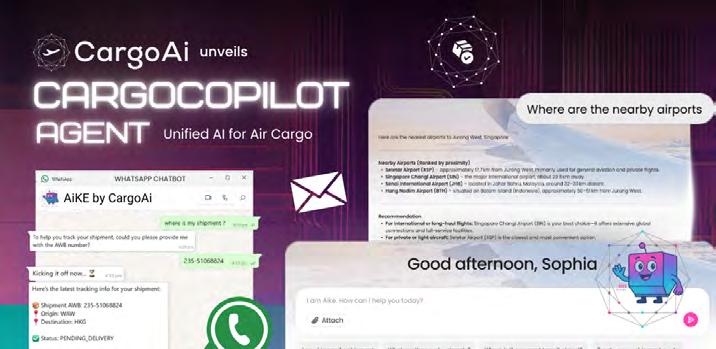
• White-label customisation for industry partners
• ONE Record compatibility
The Agent combines large language models with predictive ML for pricing and capacity, trained on proprietary datasets and millions of cargo communications. With confidenceaware automation, tasks execute instantly when reliable or escalate to humans when needed.
CargoAi’s vision is to make cargo operations more autonomous, connected, and responsive, with continuous learning and new integrations expanding the Agent’s value over time.

In Shenzhen, U-Freight’s Oceanfreight Department has grown from a modest twoperson team into a major operations centre for the Pearl River Delta area, specialising in efficient and secure FCL and LCL services.
Wong concludes: “As our Shenzhen office celebrates this important milestone, the company remains committed to evolving alongside customer needs, embracing new technologies, and continuing its tradition of logistics excellence well into the future.”
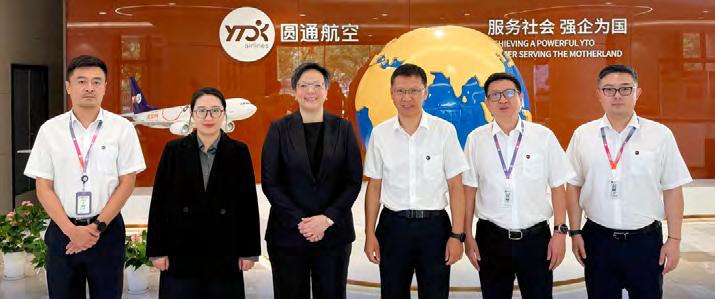
YTO’s freighter network now bookable on our platform, forwarders and shippers can manage the full lifecycle in one integrated suite, reinforcing Asia as a strategic priority for Freightos.”
“As we mark our 10th anniversary, joining WebCargo enhances our digital services and global reach,” added Hong Xiang Li, President of YTO Cargo Airlines. “This partnership accelerates our transformation into a world-class integrated logistics and supply chain provider.”
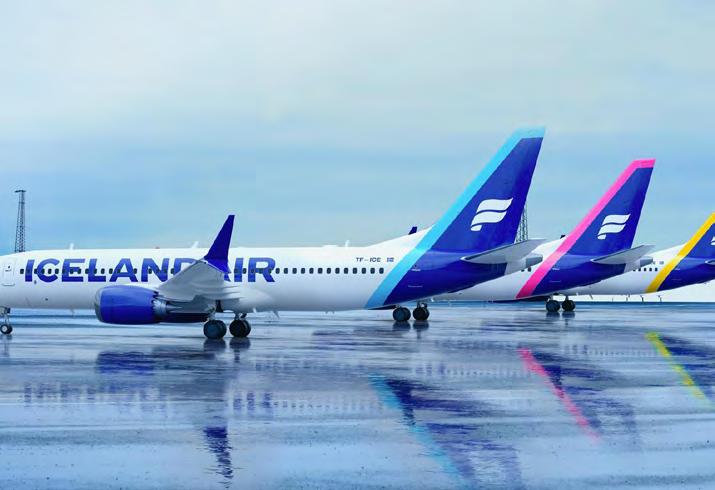
Icelandair Cargo is set to launch operations in Turkey with the support of Globe Air Cargo Turkiye, a subsidiary of ECS Group. The partnership combines Globe Air Cargo’s local market expertise with ECS Group’s global reach and digital capabilities, opening new opportunities for Turkish exporters and importers.
Starting 5 September 2025, Icelandair will operate four weekly flights between Istanbul (IST) and Keflavik (KEF) using Boeing 737 MAX aircraft. The new route provides seamless connections to the US and Europe, focusing on high-demand sectors such as textiles, automotive parts, and machinery.
“This is a major milestone for us as we expand into the Turkish market for the first time. The expertise of Globe Air Cargo Turkiye, combined with ECS Group’s digital resources, ensures our customers will experience world-class service and efficiency from the very beginning,” said Einar Már Guðmundsson, Managing Director, Icelandair Cargo.
ECS Group emphasised the strategic value of the collaboration. “This partnership
perfectly reflects our vision: connecting the global ambitions of airline partners with strong local expertise. With Globe Air Cargo Turkiye’s deep market knowledge and ECS Group’s innovation, Icelandair Cargo will quickly establish itself along this new corridor,” said Jean Ceccaldi, CEO, ECS Group.
“We are proud to represent Icelandair Cargo in this exciting launch. Our knowledge of the local market and commitment to excellence make us the ideal GSSA partner,” added Ersun Guven, Managing Director, Globe Air Cargo Turkiye.
The alliance marks a foundation for stronger air freight connectivity between Turkey, Iceland, and key transatlantic markets.
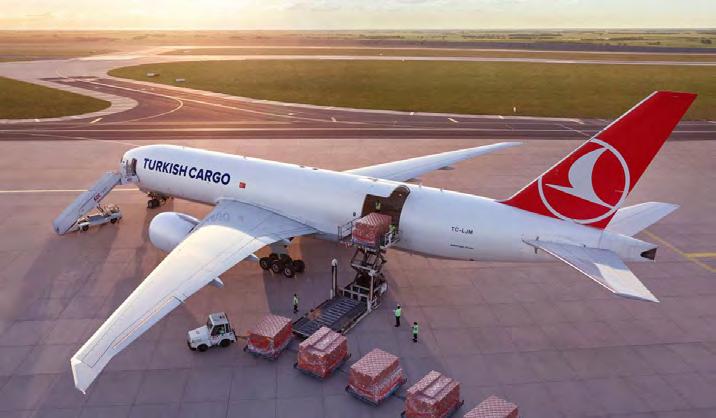
4RCargo has been appointed Turkish Cargo’s exclusive General Sales and Service Agent (GSSA) in Slovakia.
The new partnership will allow 4RCargo’s customers in the Slovak market access to Turkish Cargo’s unparalleled network connecting through Vienna, Frankfurt,
Linz, Munich, and Prague, before transiting Turkish Cargo’s central hub in Istanbul.
Responding to market demands, 4RCargo opened a new office in Bratislava earlier this year, demonstrating a clear commitment to the region and paving the way for its appointment as Turkish Cargo’s exclusive GSSA in Slovakia.
The contract will be managed from a dedicated 4RCargo office by a dedicated team.
“We greatly look forward to both representing and working with the Turkish Cargo team for the Slovakian market,” said Pawel Kazmierczak, Managing Director, 4RCargo.
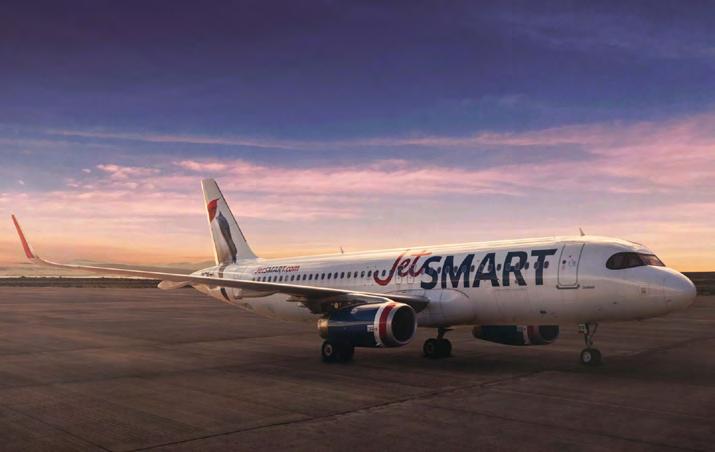
ECS Group, the global GSSA leader, marks six months of dynamic growth and operational excellence with JetSMART, South America’s leading ultra-low-cost airline group. Following their four-year Total
Cargo Management (TCM) contract, ECS Group now oversees over 25,000 annual flights for JetSMART’s four AOCs (Chile, Colombia, Peru, Argentina).
A regional team of 25 dedicated ECS Group specialists has established a robust commercial and technical infrastructure, now enabling cargo service across eight countries and fourteen top destinations— including Buenos Aires, Rio de Janeiro, Lima, Medellín, and Montevideo. A digitalised central Control Tower in San José, Costa Rica, ensures compliance, operational agility, and seamless supervision for JetSMART’s A320/ A321 fleet.
“With an easily accessible global network, the partnership between Turkish Cargo and 4RCargo will open the door for Slovak customers to continue to grow exports whilst receiving unparalleled customer experience.”
Turkish Cargo will benefit from 4RCargo’s new Customer Relationship Management (CRM) and multimodal capacity management system, SugarCRM, accessible through a mobile app, which delivers complete visibility, updating capacity information in real time to improve efficiency and visibility for 4RCargo customers and sales teams alike.
Through advanced platforms like Apollo, Quantum and CargoAi, ECS Group offers real-time analytics, giving freight forwarders unprecedented access to both domestic and international cargo corridors. The unique scope of ECS Group’s TCM goes beyond classic GSA duties. Their collaboration with TCE enables them to encompass ramp and security coordination as well as hands-on auditing to align network-wide procedures.
JetSMART and ECS Group’s shared vision is to open the entire airline network for cargo by end-2025, supported by more than 25 pending interline agreements to power global connectivity to the United States, Europe, and Asia. In 2026, ECS Group plans to drive e-commerce growth through regional warehousing, a new express product offering, and strategic alliances.

Cargo Community Network (CCN) and Innosys Pte Ltd have partnered to integrate Innosys’s FreightX software into the CUBEforall open data platform, offering forwarders a unified solution to manage operations and eliminate data silos.
The integration makes FreightX, a modern web-based freight management system, available directly within CUBEforall. Shipment data entered once in FreightX— covering air, sea, and finance workflows— can now flow seamlessly to CCN’s messaging services for Air Waybill (FWB/ FHL) submissions, as well as to third-party applications such as booking portals and compliance tools.
This “enter once, use anywhere” capability addresses one of the industry’s major pain points: the repetitive re-entry of shipment data across multiple disconnected systems, which wastes time and increases error risks.
“The power of a truly open platform isn’t just about connecting two systems—it’s about making data liquid and portable,” said Adrian Goh, CEO of CCN. “By welcoming FreightX into the CUBEforall ecosystem, we’re giving users the foundation for true digitalisation, where shipment data can be leveraged across workflows and partners.”
The partnership aligns with Innosys’s strategy to deliver accessible, nextgeneration digital solutions for logistics.
CARGOLAND has taken a major step in its digital transformation at LGG with the launch of LGG Tracking on May 15, 2025, developed with technology partner NSI. The platform marks a milestone in LGG’s vision of creating a digital twin, with more than 30 projects currently underway.
LGG Tracking is a free, centralised solution that offers a single source of truth for cargo movements. It integrates a unified messaging system linked to specific Air Waybills (AWBs), ensuring all communications are contextual and traceable. Authorised users can access realtime updates on shipment status at every stage, improving transparency, reducing
errors, and streamlining coordination. The tool also enables fully automated customs clearance, ensuring efficient, real-time completion of formalities.
“LGG Tracking is the culmination of intense collaboration and a proof point of our cargo community’s strength,” said Frederic Brun, Head of Commercial Cargo & Logistics, LGG. “The transparency we now have forms the foundation of our digital twin vision.”
The project reflects contributions from over 100 stakeholders, including airport management, airline partners, technology providers, regulators, and cargo community members. “This cross-pollination ensures each solution meets real-world needs while
Lufthansa Cargo has upgraded its digital offering, making it more intuitive, clearer, and faster to use.
The optimised eBooking interface now lets customers book general cargo shipments in about half the time, with saved searches reducing the process to as little as 30 seconds. Users also benefit from a clear overview of routing options and practical features like relevant station information. Additional services, including CO2 offsetting, are planned.
The revamped eTracking service, set to launch by the end of August, will feature a redesigned interface for easier freight tracking. Customers can also opt for proactive email notifications along
the transport chain, ensuring greater transparency and quick updates in case of delays or changes.
The digital overhaul was shaped with direct customer feedback, which guided improvements in booking steps and will continue to influence future updates. “Our new booking process delivers exactly what customers wanted: fewer clicks, shorter processes, and faster communication. It not only makes bookings easier, but also more effective. And we are not stopping there—we are investing in AI to accelerate processes, increase transparency, and improve service,” said Marcel Kling, Head of Digital Sales at Lufthansa Cargo.
These innovations highlight Lufthansa


“We built FreightX to be agile, powerful, and cloud-native,” said Lam Peng Foo, Founder and Managing Director of Innosys. “By integrating with CUBEforall, our customers benefit not only from our operational software but from the compounding value of an interconnected logistics ecosystem.”

driving momentum toward our digital twin vision,” added Torsten Wefers, VP Sales & Marketing, LGG.
With LGG Tracking live, CARGOLAND has laid a core foundation in its digitalisation strategy. As many of the 30 ongoing projects approach maturity, further significant announcements are expected soon.
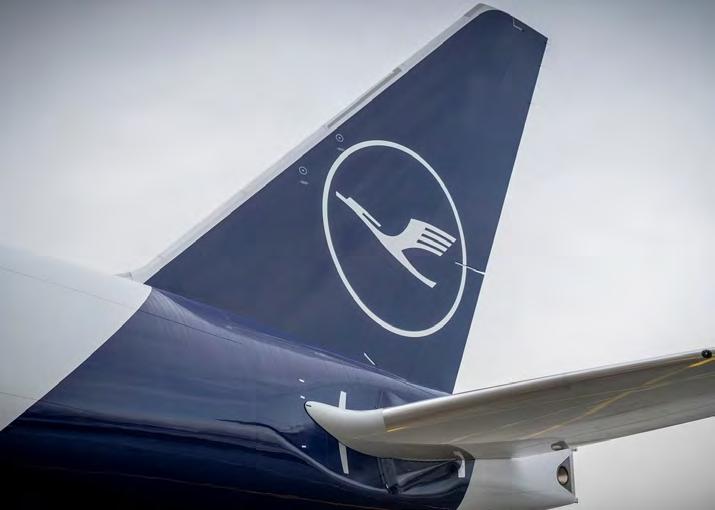
Cargo’s leadership in air freight digitalisation. This spring, the airline enabled online booking for dangerous goods shipments and, in May, launched an AI solution to process booking requests by email faster and more securely. More enhancements are in the pipeline to further streamline the customer experience.
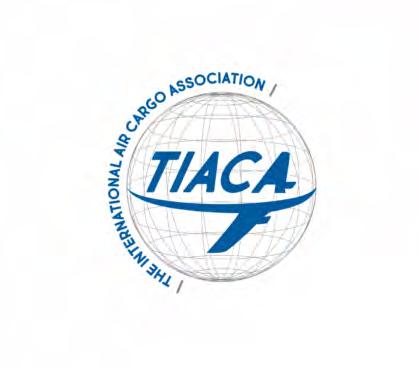
The International Air Cargo Association (TIACA) has unveiled the conference program for Air Cargo Forum (ACF) 2025, set for November 3–6 at Yas Island Arena, Abu Dhabi. The agenda features a strong lineup of sessions tackling leadership, digital transformation, sustainability, workforce development, and regional growth.
Highlights include:
• Oasis-Side Chats with Stanislas Brun (Etihad Cargo) on Abu Dhabi’s logistics role, and Tom Bradley (Amazon Air Cargo) on strategic plans.
• Industry Leaders Roundtables with executives from Atlas Air, Swissport, HACTL, Morrison Express, Astral Aviation, and CHAMP Cargosystems.
• Digitalisation in Air Cargo with leaders from Awery Aviation Software, IBS Software, and WebCargo by Freightos.
• The Middle East as a Global Gateway featuring NAFL, Saudi Cargo, and TIACA.
• Workforce Challenges with panellists from ICTS, Emirates SkyCargo, and Aviation NOW.
• Aviation Net Zero with speakers from Air France KLM Cargo, Etihad Cargo, and Meantime Communications.
• Industry Innovation with Kale Logistics and Goods2Load on AI, robotics, and automation.
• Trends & Outlook with Rotate and Aevean.
• E-commerce with SmartKargo and Mall for Women.
“The program reflects the breadth and depth of issues shaping our industry. From digital innovation to workforce development, ACF 2025 brings the right people into the right conversations at the right time,” said Steven Polmans, TIACA Chair.
With Abu Dhabi’s strategic location and advanced infrastructure, the Middle East offers one of the fastest-growing air cargo ecosystems. “The Forum will connect global leaders with this dynamic hub,” added Glyn Hughes, TIACA Director General.

step forward in our efforts with CAAS. By streamlining regulatory processes while maintaining the highest standards of safety, we’re strengthening global aviation partnerships and fostering innovation for the aerospace industry worldwide,” said Administrator Bryan Bedford.
Director-General Han Kok Juan said, “The expansion of the CAAS-FAA mutual recognition agreement is a testament to our close partnership and the trust and confidence and marks a new milestone in Singapore-US aviation cooperation. It will significantly benefit Singapore-based companies which require U.S. approval, or whose customers require U.S. approval, for their work.”
On 23 September 2025, United States Federal Aviation Administration (FAA) Administrator, Bryan Bedford and Civil Aviation Authority of Singapore (CAAS) Director-General, Han Kok Juan, signed an enhanced Bilateral Aviation Safety Agreement – Implementation Procedures for Airworthiness (BASA-IPA) at the International Civil Aviation Organisation (ICAO) 42nd Assembly.
The enhanced agreement streamlines the validation process for certain aircraft modification designs between the FAA and CAAS. Additionally, under the enhanced agreement, the FAA will now recognise CAAS approvals for minor aircraft modification, all aircraft repair, and minor changes to article designs.
“This agreement underscores a significant
The FAA and CAAS first signed a BASA-IPA in 2007. The enhanced agreement is the result of a joint FAA-CAAS review, which included site visits by the FAA to Singapore-based aviation and aerospace companies.

Airport Authority Hong Kong (AAHK) announced that William Ho is starting his appointment today as Executive Director, Corporate Development. Reporting to the Chief Executive Officer (CEO), Mr Ho will be responsible for driving digitalisation and innovations at Hong Kong International Airport (HKIA) and formulating strategies for the growth of its hub functions.
Mr Ho has a wealth of experience in technological transformation, sales and marketing, and business development in local, Mainland China, and international markets. Prior to joining AAHK, he was a Strategic Advisor at Aryaka Networks, focusing on international expansion and operational optimisation. He had also held senior leadership positions
at Hong Kong Broadband Network Limited, Juniper Networks, Cohesity, ARRIS, Cisco, and the Hong Kong Jockey Club.
Vivian Cheung, CEO of AAHK, said, “We are delighted to welcome Mr William Ho to our leadership team. His extensive background in business transformation and digital innovation will contribute to our efforts in further sharpening competitiveness. I look forward to working closely with him and the executive team to consolidate HKIA’s position as the leading international aviation hub in the region.”
Mr Ho holds a Bachelor of Science in Electrical Engineering from the University of Calgary.

On June 1, 2025, Sabir Ebrahim was promoted to Head of Cargo Operations at WestJet Cargo. In his first 100 days, he has driven collaboration
with colleagues and customers, with a strong focus on efficiency gains and operational excellence.
Described as collaborative, driven, and peoplefocused, Sabir oversees the smooth and effective running of cargo operations while ensuring safety and security compliance. Working closely with colleagues and service partners, he aims to identify improvements in day-to-day processes to further enhance performance. “It’s not just about efficiency; it’s about translating commercial needs into operational excellence while upholding the highest standards of safety and security,” he explained.
Julius Mooney, Director – Cargo Commercial, praised Sabir’s blend of pricing and operations
Austrian Airlines has named Stefan-Kenan Scheib, currently Head of Flight Operations at SWISS, as its new Chief Operating Officer effective 15 September 2025. The appointment, approved by the Supervisory Board, follows Francesco Sciortino’s move to Lufthansa Airlines as Hub Manager Frankfurt and Accountable Manager.
Scheib began his aviation career in 1999 as a Lufthansa first officer on the Airbus A320, later becoming captain at Germanwings where he also held leadership roles in flight safety, crew training, and operations. In 2017, he was appointed Head of the Pilot School Bremen at Lufthansa Aviation Training (LAT) and later oversaw all LAT pilot schools, completing an MBA at Hochschule Koblenz during this time. Since 2021, he has led flight operations at
SWISS, a Lufthansa Group carrier.
With his appointment, the Austrian Airlines Executive Board will consist of Annette Mann (CEO) and Stefan-Kenan Scheib (COO). Mann retains responsibility for Business Development, Public Affairs, Brand & Communication, Legal & Compliance, Network Planning, Finance, HR, Customer Experience & Hospitality, and Sales Austria & Slovakia. Scheib will oversee Flight and Cabin Operations, Ground Operations, Flight Safety, Crew Training, Operations Planning & Steering, Technical Division, and IT.
“Austrian has achieved top performance in punctuality and reliability, and Stefan-Kenan Scheib brings proven expertise to continue this success,” said Till Streichert, Chairman of


expertise. “His fresh perspectives on safety, security, ramp and warehouse operations are already shaping our next steps as we optimise processes to meet commercial goals,” he said.
Reflecting on his first months, Sabir emphasised immersing himself in the operational rhythm and engaging with both internal stakeholders and external service partners. “It has been an incredible journey so far, and I am thankful to my knowledgeable team for the seamless transition,” he noted.
Sabir concluded: “By building strong relationships and gaining deep insight into our processes and partnerships, we can enhance efficiency and uphold our commitment to excellence. The strength and professionalism of our team is our greatest asset.”

the Supervisory Board and Lufthansa CFO. CEO Annette Mann added: “I look forward to working with Stefan as we continue to strengthen Austrian Airlines’ operational excellence.”

Airport Authority Hong Kong (AAHK) has appointed Tommy Leung as Executive Director of Engineering & Technical Services, effective 1 October 2025. In his new role, he will oversee the management and delivery of all capital works projects at Hong Kong International
Airport (HKIA) as well as the engineering and maintenance of airport facilities and systems. The newly created division integrates the former Engineering & Technology and Third Runway Divisions.
Leung has been Executive Director of the Third Runway since 2022, where he led the project management and on-time delivery of the Three-runway System in 2024. He joined AAHK in 1994 and has held several senior positions across technical services, terminal operations, and major developments. From 2016 to 2022, he served as Deputy Director of Third Runway Project Management before his promotion. Between 2006 and 2009, he was Chief Operating Officer of Hong Kong-Zhuhai Airport Management Company Limited.
The appointment follows the retirement of Ricky Leung, Executive Director of Engineering & Technology, who leaves after 33 years of service at HKIA. He will assume the role of Chief Executive Officer of HKIA Management Limited, a subsidiary of AAHK, to advance airport management opportunities through partnerships with Belt and Road countries.
Alexander Winter will take over as Managing Director of Dachser’s Air & Sea Logistics EMEA business unit on October 1. He succeeds Marc Meier, who will leave the company at the end of the month.
Alexander Winter, 53, from Austria, comes from DB Schenker (now part of DSV), where he has held various management positions since 1999 with a focus on sea freight and contract logistics. Since 2018, he has been CEO for Austria and the Southeast Europe region, responsible for air and sea freight, road transport, and contract logistics, where he drove the growth of the logistics service provider. In his new role as Managing Director Air & Sea Logistics EMEA at Dachser, Alexander Winter will report to Dr. Tobias Burger, COO Air & Sea Logistics.
“With Alexander Winter, we have gained a leader with extensive experience in the international logistics business for Dachser,” explains Dr. Tobias Burger, COO Air & Sea Logistics at Dachser. “In his successful career, he has proven that he can develop local markets in a customer-oriented manner and set them up to be operationally efficient.”
In our core markets of Europe in particular, we need a strong air and sea freight organisation that drives growth with globally integrated end-to-end transport and contract logistics,” explains Burkhard Eling, CEO of Dachser. “With his extensive logistics and management experience, Alexander Winter has what it takes to take the close connection with our European groupage network to a new level.”


Swissport has appointed Ajay Barolia as Executive Vice President Cargo for North America, where he will lead the company’s regional air cargo business and report directly to CEO Nelson Camacho. Since joining Swissport in June 2024 as SVP North America, Barolia has made significant contributions,
and his new role reflects Swissport’s focus on operational efficiency and customer satisfaction in the region.
With over 30 years of industry experience, Barolia is recognised for his expertise in global cargo standards, operational management, and innovation. He has a proven record in optimising logistics, driving digital transformation, and advancing quality, health, safety, and environmental (QHSE) standards, positioning Swissport as a leader in nextgeneration cargo handling.
Working alongside SVP Commercial Peter Weir, Barolia also oversees a regional team of four Vice Presidents covering the East, West, Express, and Canada. Together, the team is set to strengthen Swissport’s reputation for customised cargo solutions, backed by strong
Vivian Cheung, CEO of AAHK, said: “I would like to thank Ricky for his outstanding contribution to AAHK and congratulate him on his new role. I also welcome Tommy to his new position, fully confident he will continue to demonstrate strong leadership in capital projects and engineering.” commercial and operational support.
“I’m privileged to lead Swissport Cargo and work with a world-class team driven by professionalism, innovation, and sustainable growth. Over the next 12 months, our priority will be expanding through joint ventures and acquisitions, while investing in modernisation and automation at key gateways,” said Barolia.
Looking ahead, he highlighted a vision for Swissport’s cargo operations to become more digital, sustainable, and resilient, leveraging technology to deliver unmatched reliability for airline and freight partners.
This appointment underlines Swissport’s commitment to deploying top-tier talent in key markets and strengthening performance across its global cargo operations.

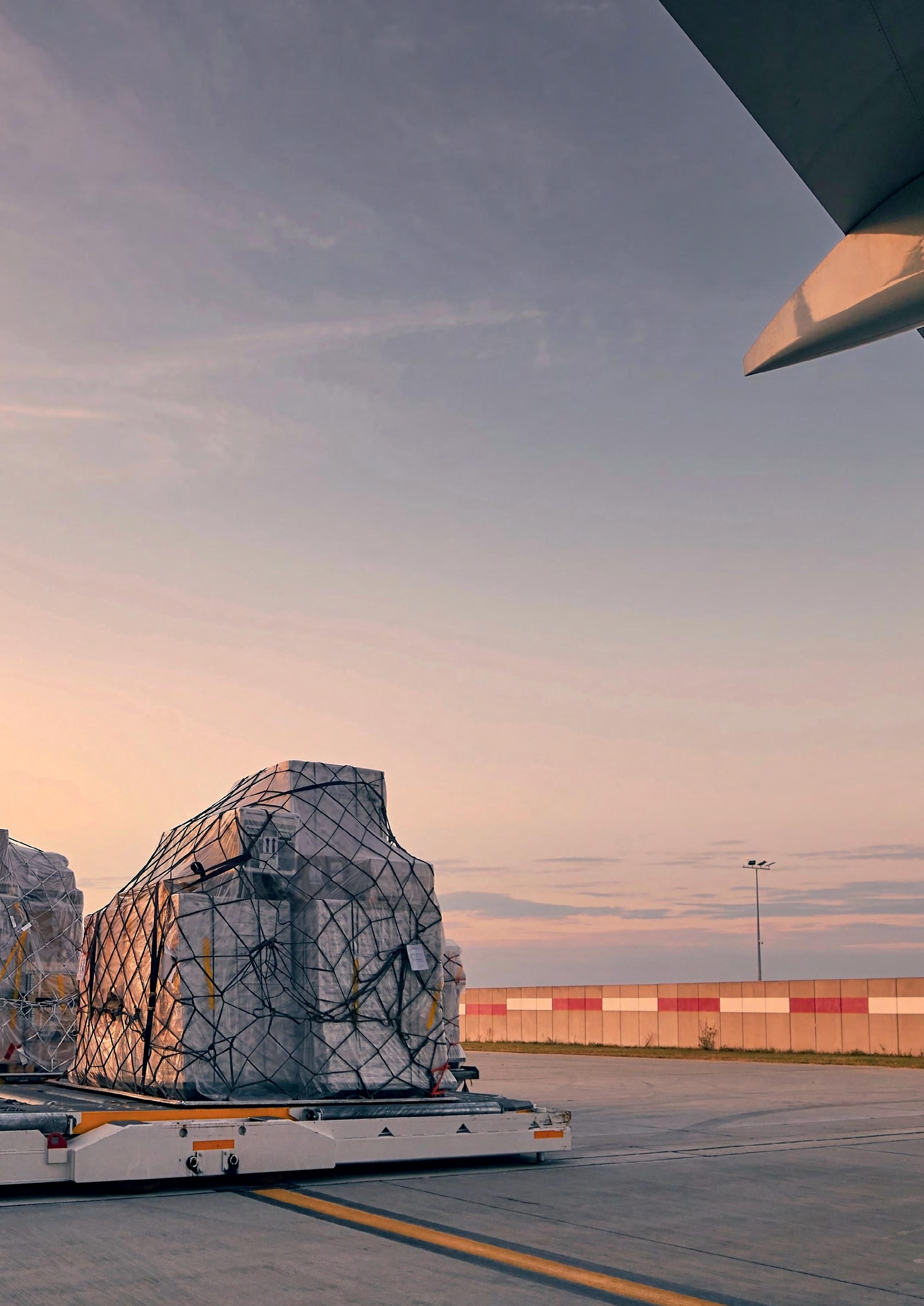
Where do you need ULDs? ACL Airshop delivers – wherever you are, whatever the need. As the global market leader in short-term ULD leasing, we simplify your ULD operations with smart, flexible solutions. Whether you’re facing imbalances, charters, or last-minute emergencies, our global team ensures quick response and delivery within 24 hours. One-way lease options, logistics services, and worldwide availability – all from one trusted partner.
For more information please contact: sales@aclairshop.com

KLN Logistics Group Limited is at the forefront of Asia’s rapidly evolving e-commerce logistics revolution, where speed, precision, and digital integration are no longer optional but essential to success. Asia’s e-commerce market revenue is projected to reach approximately US$1.53 trillion1 in 2025, growing annually at around 7.7%, making it the global epicentre of e-commerce growth. Concurrently, Asia-Pacific air cargo demand, driven strongly by e-commerce volumes, grew by roughly 11% year-on-year in mid-20252, reshaping regional logistics capacity and flows. KLN is aggressively scaling its fulfilment capabilities using automation and smart warehouses. At the same time, it pioneers cross-border digital platforms to deliver fast, flexible, and reliable service. Through this strategic transformation, KLN is emerging not just as a service provider but as a key enabler of Asia’s digital trade future.
“Strategic rebranding, regional hub expansion and partnership moves, including building-controlled airfreight networks and growing the group’s pan-Asia footprint, pushed KLN to make e-commerce an important portfolio of our service offerings,” says Wong Siew Loong, Chief Operating Officer of KLN. “KLN’s development of its own controlled network (Kerry Freight Controlled Network) and expansion of hubs and domestic distribution centres exemplify this strategic shift.”
The move gained further momentum through integration with SF-related groups and a rebranding that positioned KLN for a bigger role in global e-commerce flows. Investments in fulfilment and warehousing infrastructure are accelerating this pivot, allowing KLN to capture cross-border growth opportunities at scale.
Delivering results amid market shifts
This pivot has not only been strategic but also financially impactful. In its latest
earnings, KLN posted double-digit growth in core net profit in the first half of 2025, outperforming peers despite global market headwinds3. The results reflected not just cost discipline but the strength of KLN’s diversified portfolio and the resilience of its e-commerce and logistics solutions.
According to Wong, partnerships have been key to this resilience. A notable example is the collaboration with SF Express and Etihad Cargo to launch cargo operations into Abu Dhabi, where KLN acts as the local logistics
1 Statista, “eCommerce - Asia | Market Forecast,” January 8, 2025, https://www.statista.com/outlook/emo/ecommerce/asia; IATA, “Air Cargo Market Analysis,” July 2025, https://www.iata.org/en/iata-repository/publications/economic-reports/air-cargo-market-analysis-july-2025/
2 GlobalF.com, “Asia Pacific Air Freight Grows as China’s eCommerce Slows,” September 3, 2025, https://globalf.com/asia-pacific-air-freightgrows-as-chinas-ecommerce-slows/
3 Payload Asia, “KLN posts double-digit growth in core net profit, outperforming market,” September 2025, https://payloadasia.com/2025/09/ kln-posts-double-digit-growth-core-net-profit-outperforming-market/


WONG SIEW LOONG Chief Operating Officer of KLN
partner. “KLN supports import/export flow, handling customs brokerage, warehousing/ distribution, last-mile connections, and network integration with SF’s flights,” Wong explains, highlighting how KLN has expanded its presence in the Middle East to connect Asia more seamlessly to global trade corridors.
Automation and smart warehouses
Technology sits at the heart of KLN’s e-commerce model. “KLN has deployed sorting robots and mobile-robot solutions in fulfilment centres to increase sort throughput, reduce manual errors and accelerate last-mile readiness — directly improving order cycle time and accuracy for fast-moving e-commerce categories,” Wong says.
Smart warehouses equipped with warehouse execution systems, automated sortation, and advanced inventory tools allow KLN to manage seasonal peaks with precision. By reducing lead times and improving order fill rates, these facilities
enable the company to meet rising expectations for speed and accuracy across multiple Asian markets.
Cross-border platforms for seamless trade
With cross-border trade fueling much of Asia’s e-commerce growth—Asia Pacific is projected to hold nearly 30% of the global cross-border e-commerce market in 20254 KLN has been building digital platforms to integrate visibility, booking, customs, and fulfilment.
“The combination of owned networks plus digital tracking and partner APIs lets KLN offer end-to-end visibility and more predictable cut-offs for cross-border deliveries,” Wong notes. This orchestration enables KLN to work more closely with carriers, marketplaces, and customs agencies — a vital capability in a fragmented trade landscape.
The company has also introduced hybrid logistics solutions that respond to customer
KLN has deployed sorting robots and mobile-robot solutions in fulfilment centres to increase sort throughput, reduce manual errors and accelerate last-mile readiness — directly improving order cycle time and accuracy for fast-moving e-commerce categories.
diversification needs. In 2025, KLN launched a China–Hong Kong hybrid model that combines bonded warehousing, crossborder connectivity, and customs facilitation to help global customers rebalance their supply chains5. This approach underscores KLN’s ability to innovate in complex corridors and create flexible options for shippers.
Robotics, AI, and the next wave of innovation
KLN’s embrace of robotics is already delivering tangible results. “Sorting robots and deployments with partners are explicit examples where robotics materially increased sorting speed and accuracy for global apparel/retail customers,” Wong says. By reducing errors and shortening fulfilment cycles, these technologies directly enhance customer satisfaction.
Looking ahead, Wong sees a wave of new technologies reshaping logistics: “Gamechanging tech [includes] wider adoption of autonomous mobile robots, AI optimisation for dynamic slotting and transport planning, advanced real-time visibility, predictive customs/clearance engines, and eventual wider use of electric/autonomous vehicles and drone delivery in niche corridors.” To prepare, KLN is piloting robotics, scaling smart warehouses, and investing in controlled networks that can integrate these tools at scale.
Regional growth and competitive edge
KLN’s strength lies in its strategic footprint across airports, gateways, and trade hubs. Its mix of owned and leased real estate, combined with regional hubs and dedicated airfreight initiatives, provides a competitive edge in offering flexible routing options and shorter transit times.
4 Mordor Intelligence, “Asia Pacific Cross-Border E-commerce Market Size & Forecast,” June 2025, https://www.coherentmarketinsights.com/ industry-reports/cross-border-ecommerce-market
5 Payload Asia, “KLN facilitates global customers’ supply chain diversification with China-Hong Kong hybrid logistics solutions,” August 2025, https://payloadasia.com/2025/08/kln-facilitates-global-customers-supply-chain-diversification-china-hong-kong-hybrid-logistics-solutions


“This mix enables rapid trans-shipment, better slot control on e-commerce-centric flights and resilient routing during capacity shocks,” Wong emphasises. In practice, it translates into faster fulfilment and a stronger value proposition for customers demanding flexibility and speed.
Customer-centric solutions
Technology and data are not only used for efficiency but also to create customer value. KLN offers shippers visibility through real-time tracking, portals, and APIs, while using data-driven forecasting to dynamically allocate capacity. This enables more personalised solutions such as popup fulfilment for promotional campaigns or dedicated cut-offs for premium customers. “Data-driven forecasting and dynamic capacity allocation allow KLN to offer tailored solutions… while managing disruptions more agilely,” Wong explains.
Alongside customer-focused innovation, KLN is embedding sustainability deeper into its operations. Wong pointed to renewable energy adoption at facilities, emissions tracking, and efficiency measures across fleets and buildings. These initiatives are balanced with growth ambitions by driving efficiency, which lowers both cost and carbon per parcel.
The road ahead
Looking to the future, Wong envisions KLN as a pivotal global integrator within Asia’s logistics ecosystem. “KLN is positioned to act as a global integrator: scaling digital platforms and rolling out automation solutions that can be replicated across emerging markets, delivering greener fulfilment at scale, and leveraging its extensive hub network to shorten cross-border transit times,” he explains.
Importantly, by continuously investing in robotics, AI, low-carbon transport, and interoperable digital APIs, KLN aims to elevate the baseline capability of Asia’s e-commerce logistics ecosystem and provide marketplace-level service guarantees.
Meanwhile, with financial performance that consistently outpaces the market, a proven track record of innovation, and an expanding regional footprint, KLN is poised to shape the next era of e-commerce logistics. Its blend of digital readiness, operational resilience, and sustainability commitment gives KLN the edge not just as a logistics provider but as a strategic partner driving transformation for Asia’s retailers and consumers alike.


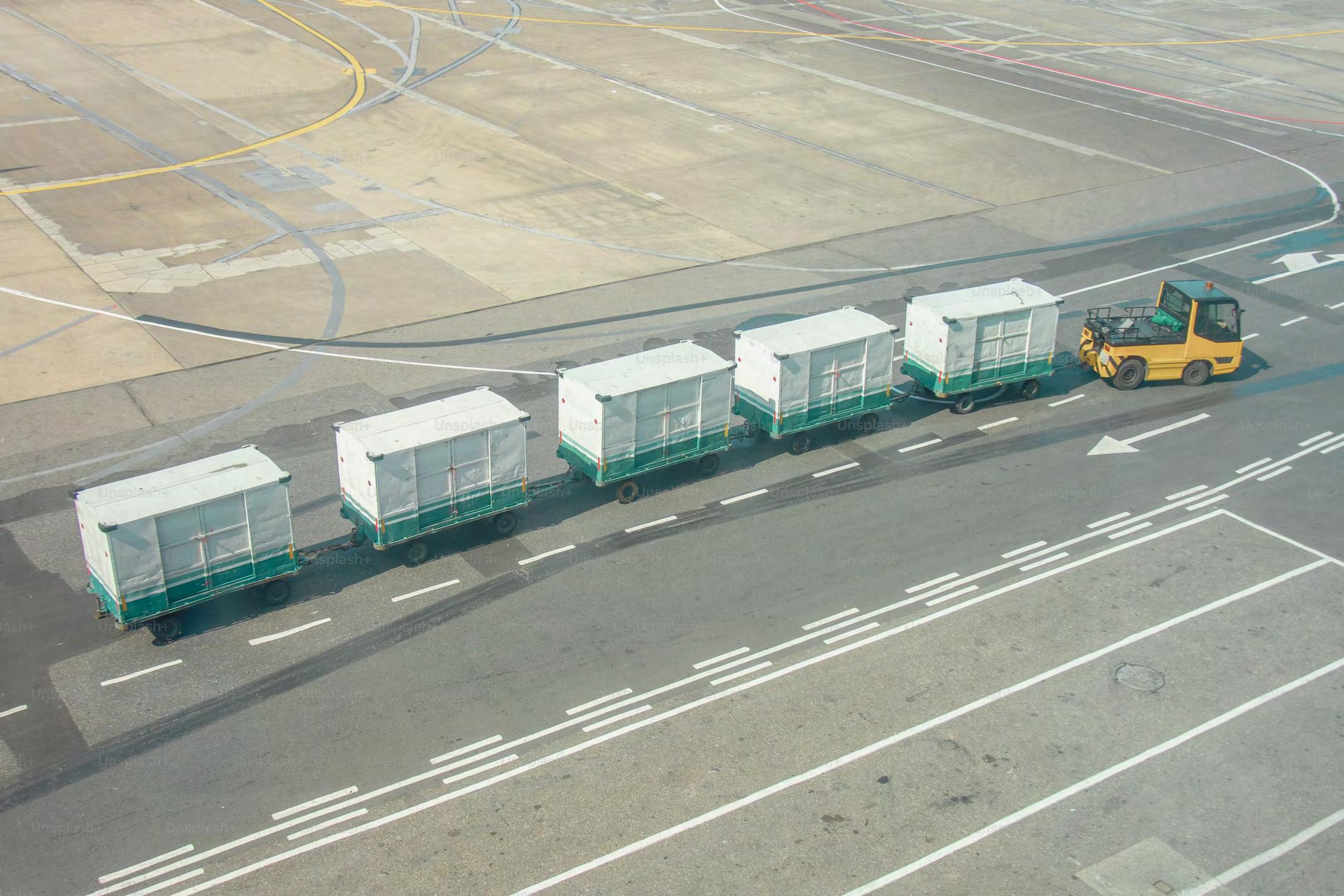


By Moritz Clausen,
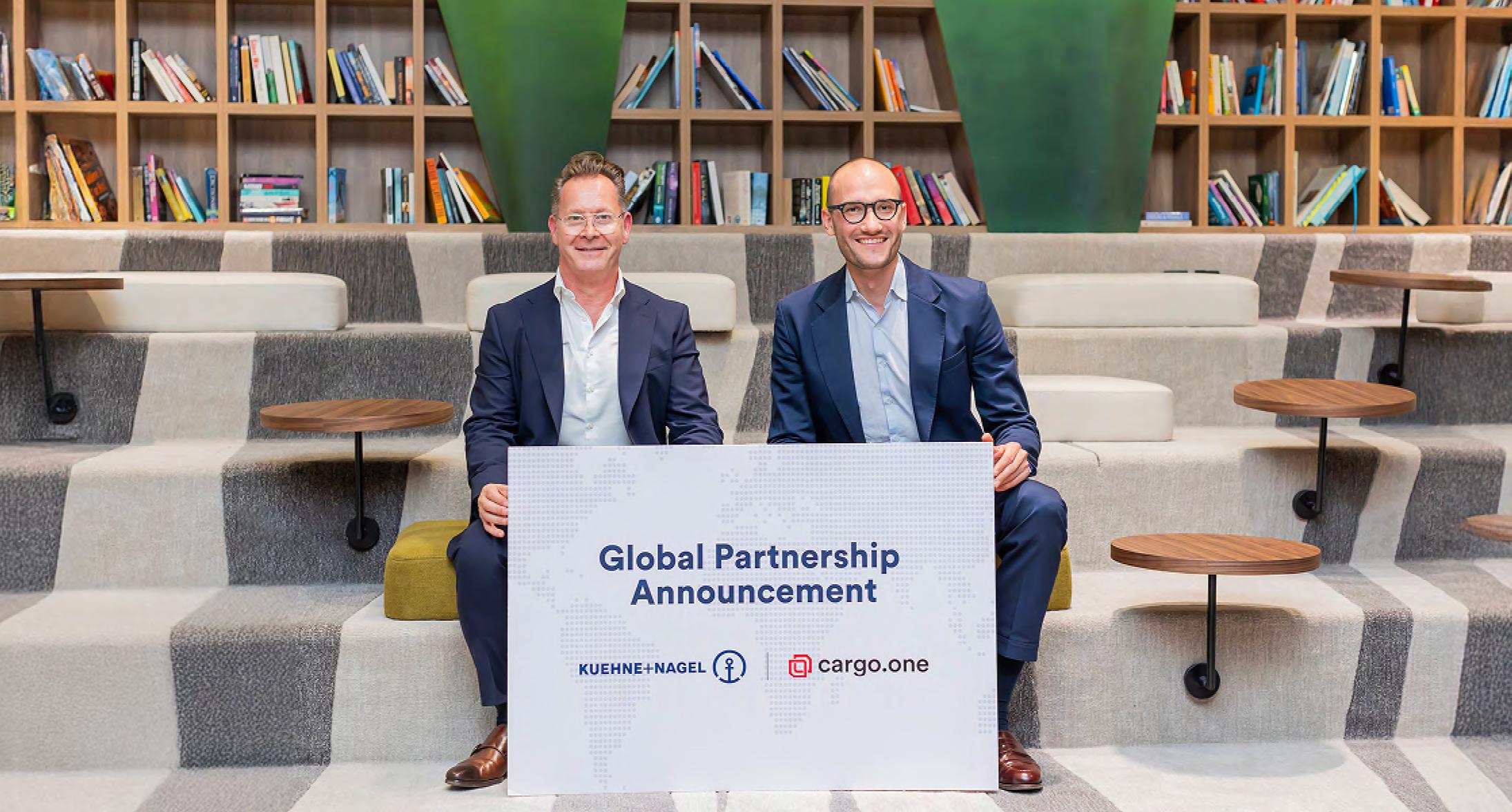
Every freight forwarder is tasked with transforming the complex procurement of buy rates into profitable and competitive end-to-end sell rates at speed. Even the largest global forwarders, with operations and sizable teams in markets worldwide, rely on maintaining the best possible visibility of their cost components to win shipments.
In modern forwarding today, the technological setup for teams has become an important competitive asset in the market – an extensive rate procurement and management infrastructure gives agents intelligent real-time access to rates and ensures a local and central view on all of the cost components.
cargo.one is relied upon for many fully digitalised and customizable capabilities – including rate procurement, rate management, derivation and delivery of sell rates, e-booking, and customer communication. These aspects enable forwarders to exercise proper strategic control over what they are selling and how they are selling it.
On an infrastructure level, data transparency and data integrity are valuable keys to unlock stronger sell rate decisions, and ultimately competitive advantage. By leveraging real-time rates from over 75 live airline connections, as well as GSSAs, accessible through one highly scalable API suite, organisations can far better respond to the latest buying conditions and fully exercise the levers of cost control
and margin management. Increasingly today, forwarders are investing in scalable infrastructure that can multiply digital gains across their global operation.
Fully customisable and AI-powered tooling delivers powerful enhancements to quoting and e-booking workflows at scale. Forwarders are seeing impressive return on investment from rate tools for
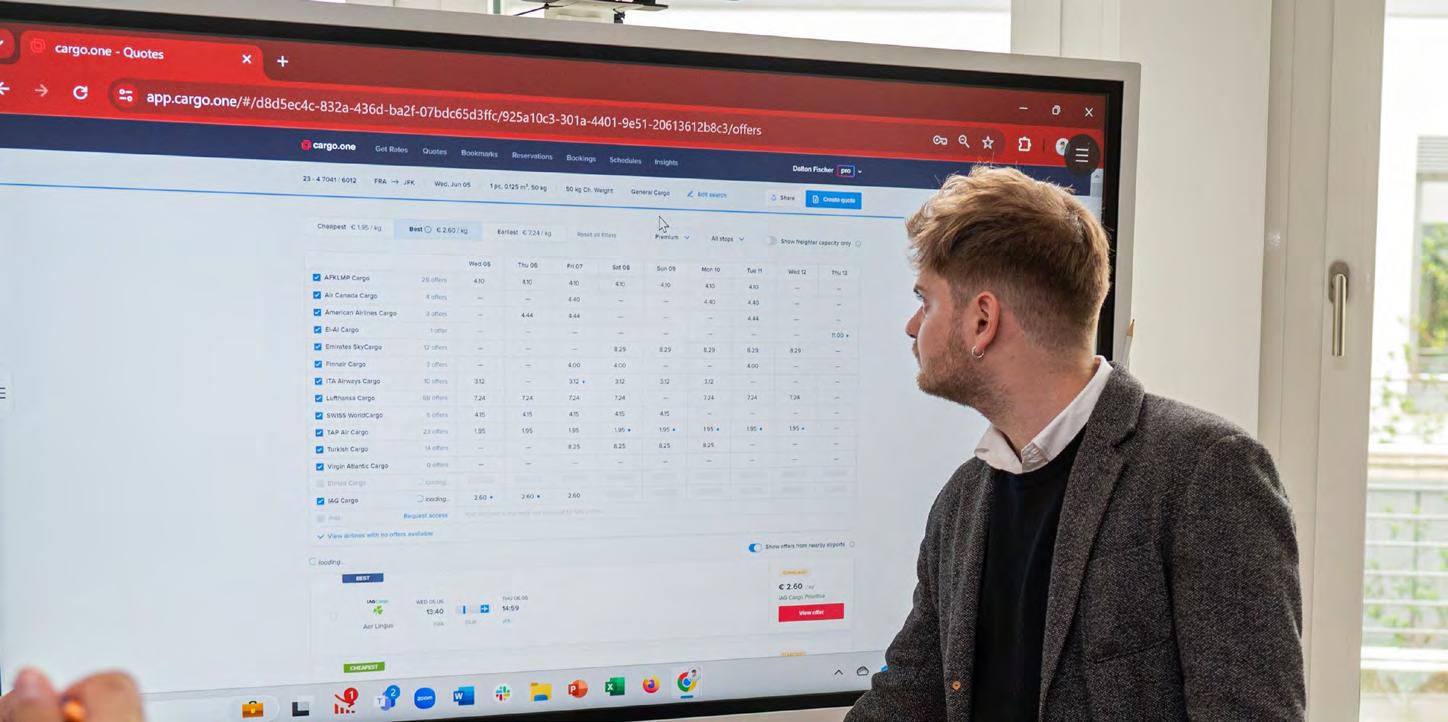

teams compiling RFQs and tenders – with a boosted capability to win shipments faster, and serve customers better.
Integrating cargo.one into proprietary in-house systems or off-the-shelf TMS is established as a fast and efficient way to benefit from the best data and insights consistently across all procurement and sales functions. The continuous data quality assurance, expanding airline partnerships, and expert support that cargo.one guarantees, works to enhance every shipment quote.
Global forwarders invest in digital partnerships
This year, there has been a strong trend of freight forwarders strengthening their in-house procurement and sales by rolling out the best digital platforms. For example, Kuehne+Nagel, extended its existing hostto-host API connections and expanded its booking system, CB Air, by integrating cargo.one’s API Suite – meaning its teams worldwide can now instantly access dozens more airlines and general sales agents for e-booking.
Holger Ketz, Senior Vice President and Global Head of Network and Carrier Management, at Kuehne+Nagel, explains, “This collaboration helps us ensure that Kuehne+Nagel always has a full spectrum market view around the clock and can respond to customers with maximum speed. cargo.one offers Kuehne+Nagel a valuable package of connectivity, innovative solutions and market experience, and this will enrich our customer experience both in the short and long term.”
Another forwarder collaborating with cargo. one to digitalise its rate management and

booking processes, is Rhenus Logistics. The forwarder has integrated cargo.one within its in-house developed TMS system to enable its operators worldwide to book with over 75 airlines instantly, around the clock. cargo.one works with Rhenus teams at both a headquarters and local level to define user stories and customer value, and co-design optimal solutions. Chris Bode, Rhenus Logistics’ VP Global Air Freight, based in Bangkok, shares, “cargo.one’s rate management solutions enable us to enhance our quoting process by working faster and more accurately.”
Global forwarder Logwin is harnessing cargo.one APIs within its TMS system. The
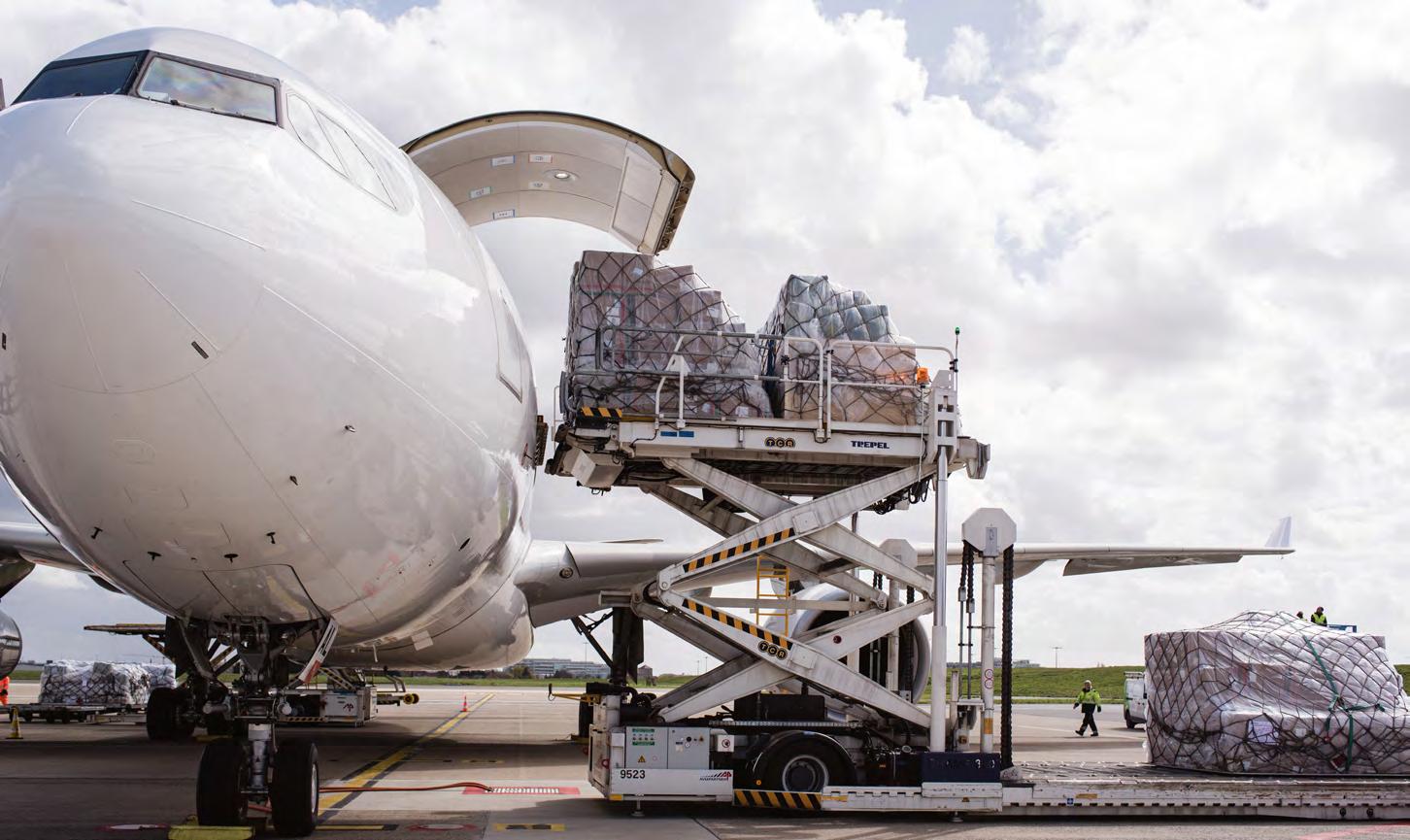

company has also deployed a cargo.one managed network which delivers instant quoting and booking between more than 100 Logwin AG branches and partners worldwide. Such a closed-loop system enables Logwin to fully leverage its network reach with speed and ease.
Ralf Hubert, Logwin AG’s COO EMEA+AMR, said, “By combining the latest generation of quoting and booking solutions, we can boost operational efficiency, working speeds, rate agility and reliability…Our managed network has enhanced Logwin’s digital workflows, eliminated fragmentation across tools, and helped branches worldwide to be strategic about what they sell to which customer.”
Such optimisation of procurement infrastructure will deliver these forwarders’ financial benefits. Optimal digital access to capacity leads to better market offerings, higher win rates and improved pricing capabilities, resulting in increased revenues. Time savings from more efficient quoting methods and better data quality will also translate into cost savings. Of course, the larger the organisational scale, the more the financial impact can be achieved.
With customised and future-proof infrastructure and solutions, freight forwarders can digitally simplify their workflows, lower operational complexity, and maximise the experience for shippers. All this ultimately positions a forwarder to compete at its best – which is true digitalisation in action.

Payload Asia (PA): From your perspective, why is the talent crisis particularly pressing in the Asia-Pacific compared to other regions?
Radesh Menon (RM): Asia-Pacific is now the growth leader in global air cargo. In July alone, airlines in the region posted 11.1% year-on-year demand growth, well above the global average of 5.5%. The region accounts for 34% of worldwide cargo traffic, so when volumes climb at this pace, the strain on people becomes acute. Added to this, Intra-Asia trade has now grown for 21 consecutive months, and Europe–Asia flows expanded by 13.5% in July. But behind that success is a workforce under pressure.
Our own research shows 59% of air cargo employees have considered leaving the industry. When volumes rise and the workforce is shrinking or disengaged, the cracks show quickly. APAC’s scale makes those cracks more visible, and the stakes for the global supply chain higher.
PA: What are the main reasons air cargo professionals are considering leaving the industry, and how does this affect carriers and handlers in APAC?
RM: Two frustrations stand out. First is technology. 42% of staff told us outdated systems were a daily source of stress. This is mainly due to inefficient usage
of technology or lack of synchronisation between various supply chain partners that results in multiple iterations of manual validations, paper-driven, archaic business processes, repeated steps due to errors and handling customer complaints. Second is well-being. This is a follow-through of the first point, and the case in point is that more than a quarter said they had thought about leaving because of burnout.
For APAC carriers, these issues are magnified by sheer volume. Intra-Asia trade grew by more than 10.3% in July. In the midst of this growth, if the industry has to deal with employee churn and the resultant need to source and reskill new personnel just as demand surges, the region risks operational bottlenecks that affect the entire global network for cargo.
PA: IBS Software’s research shows that a shortage of digitally skilled staff is a top concern. How does this gap impact dayto-day cargo operations?
RM: As per IBS Software’s latest survey of air cargo employees, 39% identified digital skill shortages as one of their company’s biggest operational challenges. In practice, this means time wasted on manual reconciliations, shipments delayed by data errors, and visibility lost when systems don’t connect.
As e-commerce growth continues to fuel Asia-Pacific’s dominance in global air cargo, the industry faces a pressing challenge: a looming talent crisis. With rising demand, fragmented shipments, and tighter turnaround times, employees are under increasing strain — and many are questioning their future in the sector. In this Q&A, Radesh Menon, Head of Product – Cargo & Logistics at IBS Software, shares insights from the company’s latest research and explains how digital platforms like iCargo can ease workforce pressures, boost efficiency, and create a more sustainable foundation for growth.
When demand is rising as fast as it is in APAC, inefficiencies compound. A single missed connection can ripple through a network already under strain. Even when carriers invest in modern platforms, if staff aren’t equipped to use them effectively, the benefits remain out of reach. That gap between potential and reality is one of the most pressing operational risks today.
PA: How can platforms like iCargo help address workforce burnout and frustration with outdated systems?
RM: Burnout is not just about long hours. It’s about repetitive, low-value tasks that drain energy. 42% of employees told us they feel held back by legacy tools and repeating process steps that can easily be automated or optimised through better process or system design. iCargo addresses that directly.
Traditionally, IT systems were built around individual business functions such as sales, revenue management, operations, and accounting. While this structure ensured each function worked well on its own, it also created silos. As data moved between functions, for instance, from sales to operations to accounting, errors and inconsistencies accumulated, leading to extra work, correction loops, and inefficiencies.

iCargo eliminates these silos by integrating sales, operations, handling, and revenue accounting into a single seamless workflow. Data is entered once and flows through the system without duplication, supported by built-in checks and balances designed for the entire shipment lifecycle from quote to bill. Bookings can be confirmed instantly with real-time visibility into capacity and yield. Shipments scanned once move smoothly through the chain, with rulebased engines handling most checks and corrections automatically.
The result is transformative: staff no longer spend time re-entering data or fixing errors. Instead, they are freed to focus on exceptions, customer service, and meaningful problem-solving, turning firefighting into value creation.
PA: With e-commerce volumes continuing to surge, how is this amplifying the talent and skills challenge across APAC’s cargo hubs?
RM: E-commerce is both the driver of growth and the amplifier of pressure. In July, cargo flows within Asia grew 10.3% year-on-year, much of it e-commerce. These shipments are smaller, more fragmented, and demand fast turnaround. For employees, that means heavier workloads and tighter deadlines.
Without automation and digital skills, staff end up overwhelmed. It’s telling that 26% of employees cite burnout as a reason for wanting to leave. E-commerce is accelerating that trend. Unless the workforce is supported with tools that automate repetitive processes and training that builds digital confidence, the growth story could quickly become a retention crisis.
PA: Can you share examples of how iCargo has enabled carriers or handlers to improve efficiency, visibility, and scalability while also easing operational pressures on staff?
RM: One example is our iCargo Cargo Terminal Operations module, which uses mobile devices and digital workflows to orchestrate processes seamlessly. The principle is simple: capture data once, at the point of occurrence. In many cargo facilities, customer service has long been a bottleneck - staff re-enter shipment details manually to mark freight as “Ready for carriage,” creating long queues, traffic congestion, and frustration for customers and employees alike. By shifting much of this data capture online and introducing electronic checkin kiosks, iCargo streamlines the process,
reduces congestion, and relieves pressure on terminal staff. The result is smoother operations, happier employees, and stressfree customer service.
Another example is iPartner Handling, which provides airlines and ground handlers with a shared digital platform instead of relying on calls and emails to align processes. This is particularly valuable for special shipments such as pharmaceuticals, which require strict quality steps beyond the limits of standard industry messaging. With iPartner Handling, ground handling staff gain clarity in their work, avoid the hassle of juggling multiple airline systems, and improve adherence to Service Level Agreements (SLAs). Airlines, in turn, benefit from greater transparency across their global networks, whether shipments are handled in their own warehouses or by third-party partners. Customers have reported not only efficiency gains but also improved morale, as outdated workflows and paper-based documentation give way to streamlined digital processes.
PA: Beyond efficiency, how can digitisation improve the employee experience — making roles in air cargo more attractive and sustainable?
RM: Digitisation doesn’t just save time; it changes the nature of the job. Employees want to feel that their work matters. When systems are outdated, 42% of staff say they feel held back. When digital platforms give them real-time visibility and decisionmaking power, their sense of ownership grows. A modern, mobile-first environment also appeals to younger generations who won’t accept paper-heavy, fragmented processes. Nearly half (49%) of the people we surveyed said they were drawn to the sector out of passion for aviation and transport. Digitisation can protect that passion by ensuring the work is engaging rather than draining.
PA: What steps should the industry take to build a future-ready workforce in APAC, and how do you see digital platforms playing a role in training or upskilling?
RM: Workforce investment has to go beyond recruitment. 22% of staff told us they feel their careers aren’t progressing, and that’s a red flag. Training and upskilling are critical, but so is showing employees where those skills can take them. Digital platforms like iCargo help because they are modular and intuitive, so staff can build confidence step by step. When training is embedded in the tools people use every day,

adoption is smoother. Combine that with clear pathways for growth and recognition, and you transform the employee value proposition in APAC. That is the only way to keep pace with the demand growth of 11.1% or more.
PA: How do you see the balance between investing in people versus investing in technology evolving in the next 3–5 years for APAC cargo players?
RM: The research tells us clearly: 59% of employees have considered leaving. That is the warning sign. Technology investment alone will not solve it. People need training, recognition, and growth opportunities to stay motivated. At the same time, without modern systems, staff will continue to feel frustrated and undervalued. In the next five years, I expect APAC operators to bring these investments closer together. Digital platforms will become the enablers of workforce development, not just operational tools. The companies that align people and technology will be the ones that sustain both growth and loyalty in the years ahead.
PA: What’s your outlook for APAC air cargo over the next few years, and how is IBS Software positioning iCargo to support both growth and the people who power the industry?
RM: APAC is driving the future of air cargo. With demand the strongest worldwide and e-commerce fuelling intra-Asia flows, the region continues to hold up global traffic and performance even amid uncertainties from tariff-induced trade imbalances. The challenge, however, is scaling without exhausting the people who keep the system running.
At IBS Software, we see iCargo as both a growth engine and a workforce enabler. Airlines like China Airlines and Air India are deploying the platform to modernise operations end-to-end, whilst our work with Singapore Airlines on digital shipment records shows how collaboration can reshape data flows across the ecosystem.
For staff, iCargo reduces the daily friction of outdated systems. It automates repetitive tasks, integrates sales through to handling, and delivers real-time visibility. That means fewer manual workarounds, less burnout, and more confidence.
By Monina Eugenio

The Asia Pacific Aviation Safety Seminar (APASS) 2025 brought together safety leaders, regulators, and industry stakeholders in Manila from 10-11 September to discuss the region’s most pressing safety challenges. Under the theme “Safety Without Borders, Global Partnerships, Local Impact,” the event reinforced the aviation sector’s commitment to collaboration in building a safer and more resilient industry.
Hosted by the Association of Asia Pacific Airlines (AAPA) and Philippine Airlines, this year’s seminar expanded its scope with dedicated streams on flight operations, cabin safety, engineering and maintenance, and turboprop operations.
In his welcome remarks, Subhas Menon, Director General of AAPA, framed the event against a turbulent operating environment marked by trade tensions, supply chain disruptions, and climate change. Despite these challenges, Menon emphasised that aviation remains the safest mode of transport through global cooperation and risk management. “Safety is a discipline of risk management. The better we manage emerging risks, the safer we will be,” he said.
Menon reminded delegates that safety is not static but must be continuously strengthened through dialogue, learning,
and the sharing of data and best practices.
Similarly, Richard Nuttall, President of Philippine Airlines, reinforced this message, noting that “safety is not confined by geography or organisation. It’s a shared commitment that binds us all.”
Lt. Gen. Raul del Rosario, Director General of the Civil Aviation Authority of the Philippines (CAAP), echoed the importance of collaboration, highlighting local initiatives
aligned with global standards, from digitised oversight systems to upgraded emergency response equipment.
From an international perspective, Tao Ma, International Civil Aviation Organisation (ICAO) Regional Director for Asia and the Pacific, underlined the region’s ambitious goal of achieving zero fatalities in commercial operations by 2030. He warned, however, that “the APAC region’s average safety oversight performance still lags
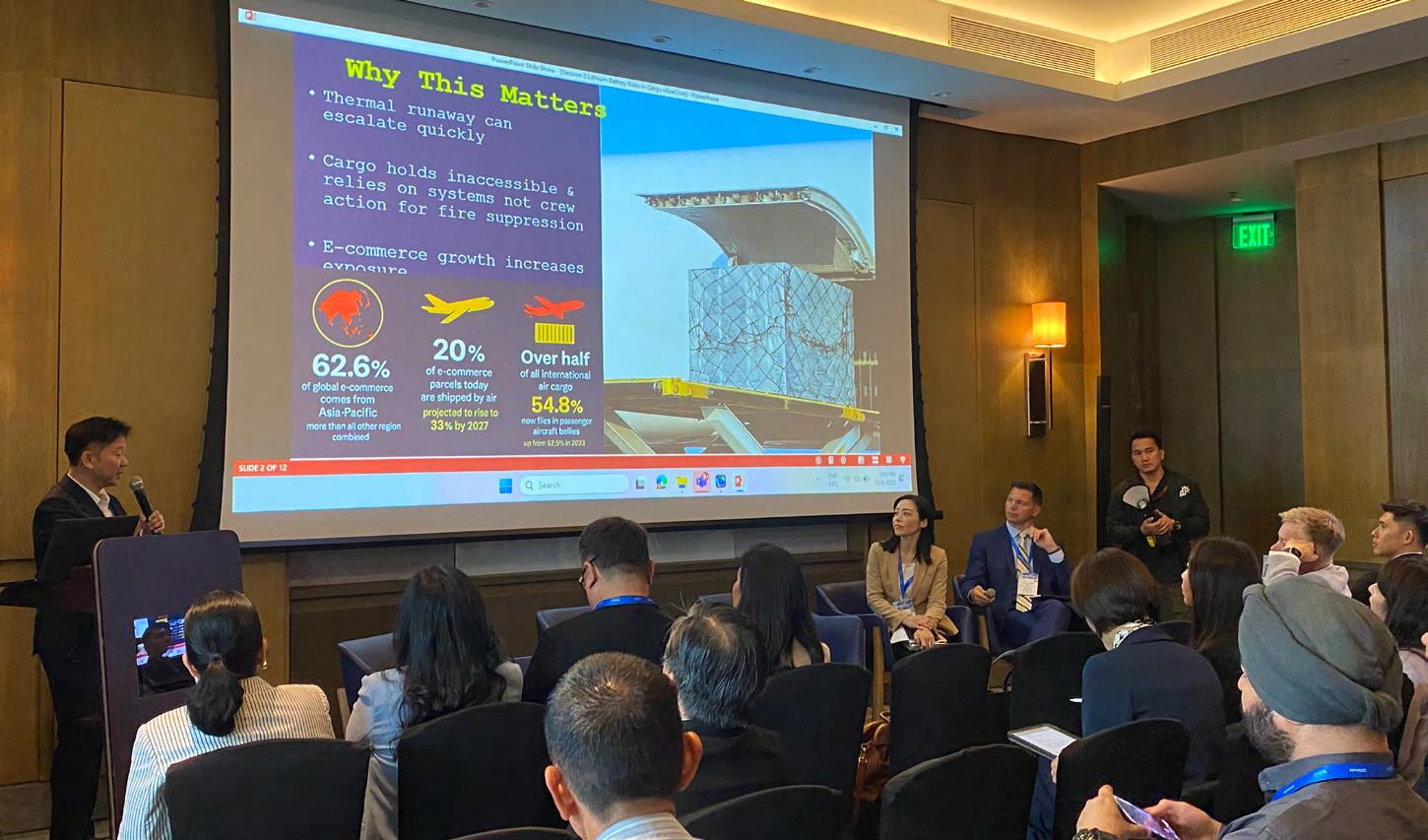

behind the global average, and more needs to be done to strengthen safety culture and technical capacity.”
Meanwhile, Dr. Hassan Shahidi, President and CEO of the Flight Safety Foundation, stressed the critical role of leadership in ensuring compliance and preventing risks. “Safety isn’t just about compliance — it’s about leadership and accountability at every level,” he said, calling for enhanced collaboration, stronger data sharing, and the adoption of new technologies.
Spotlight on cargo: Lithium battery fire risks
One of the most urgent discussions of APASS 2025 centred on the management of lithium-powered device fire risks in aircraft cabins and cargo holds. With e-commerce volumes surging across the Asia Pacific, the safe transport of batteries and electronic goods has become a top concern for airlines and regulators.
Capt. Lee Ooi Kok of Singapore Airlines highlighted the unique challenges of lithium-ion shipments, noting that thermal runaway is unlike any conventional fire. “It can escalate very quickly, and in the cargo hold, which is inaccessible to the crew, all you can do is try to suppress it,” he said.
Asia Pacific already accounts for more than 60 percent of global e-commerce, and as much as 20 percent of these shipments are transported by air — a share expected to rise to one-third by 2027. The implication for air cargo carriers is clear: fire risks linked to battery shipments will grow in parallel with market demand.

Capt. Lee pointed to containment tools such as fire-resistant unit load devices (ULDs) as critical safeguards, even though their use is not yet mandated. “They look normal, but inside, they are lined with composite fireresistant materials. These tools trap the heat and smoke and buy pilots valuable time to make decisions,” he explained. Best practices include crew training, conducting stricter audits, and consistently applying safety protocols across the supply chain.
AAPA’s call for stronger regulatory alignment
In an interview with Payload Asia, Subhas Menon emphasised that airlines cannot tackle lithium battery risks alone. “Airlines are left to their own devices. No regulator has come out with a coordinated policy framework,” he said. “We want governments
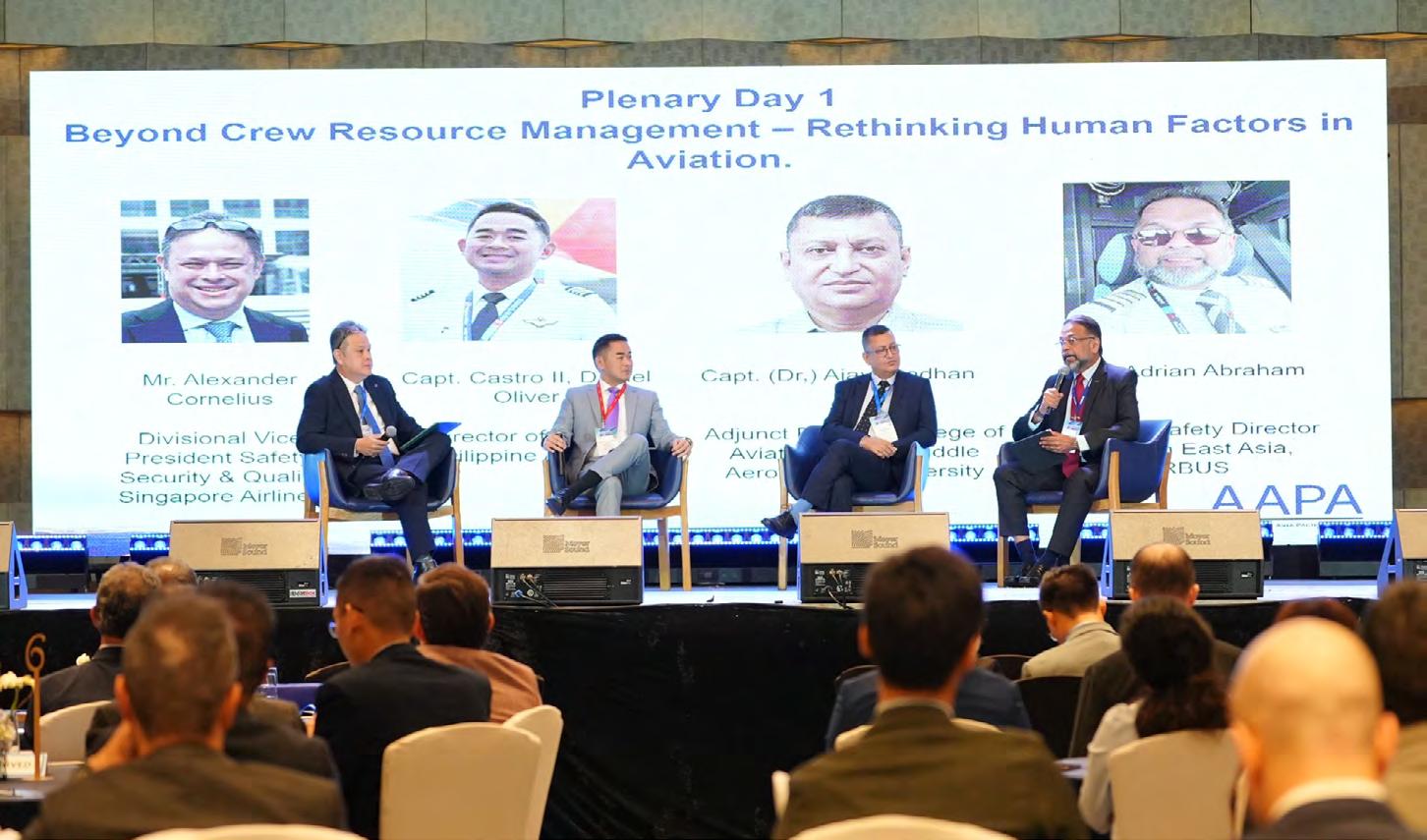
to address the issue, not just leave it to airlines. They need to develop regulations and coordinate among themselves so that the same rules apply everywhere you fly, not only in the region but globally.”
He also highlighted the role of supply chain players: “Where you have incidents, it’s because the rules were ignored. Shippers, forwarders, and handlers must follow the regulations strictly — and those who violate should be penalised.”
On balancing safety with other industry priorities, Menon stressed that sustainability and efficiency measures must never compromise safety. “Sustainability and safety are complementary. Whatever innovations are introduced, they must be tested and rolled out without compromising safety,” he said.
Looking ahead, he pointed to the promise of data-sharing and emerging technologies such as AI. “We need to work together to identify the risks of the future. To share data, we must first collect it, test it, and then ensure it is shared across the industry so that everyone benefits,” he shared.
Throughout the two-day seminar, the consistent message was that safety is a shared responsibility — requiring regulators to harmonise oversight, airlines to adopt best practices, and supply chain stakeholders to strictly comply with dangerous goods regulations.
As Menon concluded, “We have to learn from the past so that history does not repeat itself, and use that competency to identify and address the risks of the future.”





